We’re sorry, this site is currently experiencing technical difficulties. Please try again in a few moments. Exception: request blocked

Vacations in Spain: Where can I travel from and what are the requisites for entry to the country?
Ahead of the tourism high season, the spanish government is seeking to facilitate international mobility. here are the main conditions you will need to meet before you can cross the border.
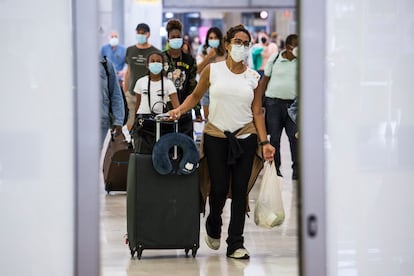
Spain reopened its borders to global travelers on Monday, and tourists from any part of the world will be able to visit the country during the summer high season. That was the announcement made by Prime Minister Pedro Sánchez on May 21 at the Fitur tourism fair in Madrid – but there is plenty of small print for those traveling to Spanish shores, depending on who they are and where they are coming from. There are different requirements according to the reason for the trip – essential travel or for leisure – the place of origin – from inside or outside the European Union – and even the type of tourist – whether or not they have been vaccinated.
The new measures are aimed at facilitating international mobility now that the coronavirus vaccine campaigns are progressing across the world. The EU’s Digital Covid Certificate will also assist with this process, a scheme that will be fully in force by July 1 but is already being used in a number of member states (the majority of Spanish regions are already issuing them, for example).
Below are the main questions and answers for tourists who want to visit Spain in the coming months.
Can you visit Spain for a leisure trip from other EU countries?
Yes, you can. This kind of travel, in fact, was only restricted during the toughest part of the pandemic – the three-month lockdown that began in March 2020. After this phase, once the internal borders of the EU were reopened, they have not been closed again apart from a few exceptions. That led to a paradoxical situation that lasted for months, whereby a German national could travel to the Balearic Islands or Andalusia, while residents of Spain could not leave their own region due to the perimetral lockdowns in force.
Are there any restrictions for these European travelers?
It depends on the case. From the green-light areas designated by the European Centre for Disease Control (ECDC) you can travel without any barriers – but in practice there are few European territories that are on this level. The majority – except some zones in Finland, Norway, Iceland and Malta – will have to present an additional requirement for entry: a vaccination certificate, a negative PCR or antigen test carried out in the 48 hours prior to arrival, or a certificate showing the bearer has contracted, and recovered from, Covid-19. Any of these documents should be in Spanish, English, French or German, or alternatively translated into Spanish by an official body. Minors under 12 are exempt from these requirements.
Are any vaccines accepted, and is one dose enough?
No. Firstly, the vaccines administered must have been approved by either the European Medicines Agency (EMA) or the World Health Organization (WHO) – i.e. Pfizer-BioNTech, Moderna, Oxford-AstraZeneca, Janssen, Sinopharm or Sinovac-Coronavac. What’s more, proof of vaccination will only be valid once 14 days have passed since receiving the full doses required for the vaccine to offer full protection – two doses in all cases but the Janssen medication, which only requires one. The vaccination certificate must have been issued by the appropriate authorities in the country of origin and must include name and surname, date of vaccination (indicating the day the last shot was administered), type of vaccine, number of doses, country of issue and the details of which body issued the certificate.
How do you prove that you have had and overcome Covid-19?
In this case, the recovery certificate must be issued by the competent authority or by a medical service at least 11 days after the first positive PCR test has been carried out. These natural antibodies against the virus are considered to be valid for 180 days, which is the time that this certificate will allow people to travel within the EU. The document must include the bearer’s full name, the date the test was taken, the type of test and the country of issue.
From which non-EU countries can you travel without restrictions?
There is a list of countries whose residents are not affected by the temporary restrictions on non-essential travel to the European Union. That’s to say, areas from which you can travel with no barriers due to their current control of the pandemic. These countries or territories are: Australia, South Korea, Israel, Japan, New Zealand, United Kingdom , Rwanda, Singapore, Thailand, China, Hong Kong and Macao. In these cases, it is not necessary to present evidence of a negative coronavirus test, vaccination or having overcome the disease. It should be noted that in the case of the United Kingdom , Spain remains on the government’s “amber list.” This means travelers returning to the UK from Spain must take a coronavirus test before travel, quarantine for at least 10 days on return, and take two home PCR tests that must come back negative before quarantine can end.
And from the rest of the non-EU countries, can people visit Spain for tourism?
The reopening of the country on Monday was designed for these countries. Specifically, all travelers who have been fully vaccinated with one of the medications approved by the EMA or the OMS two weeks prior to arrival . Tourists who cannot prove they are immunized under these conditions are excluded, even if they have a negative test, have been vaccinated with a different medication, or can prove they have overcome Covid-19.
What about minors who have not been vaccinated?
The under-12s who are traveling with an adult who has had a vaccine that’s been approved by the EMA or the WHO can enter Spain with no restrictions.
Are there any exceptions?
Yes. The government has kept an ace up its sleeve for when new variants of the virus emerge and can thus exclude countries where these strains are circulating out of control. For example, the government order specifies that risk countries are subject to quarantine. Currently, only India is in this situation, meaning that tourists cannot come from there to Spain even if they are fully vaccinated.
In practice, arrivals from Brazil and South Africa are also barred. The exceptions are for Spanish or Andorran nationals, residents of those two countries, or passengers in transit to a non-Schengen area country with a layover of less than 24 hours (without leaving the airport transit area), as well as airline personal necessary for air transportation activities.
Are there any ways you can travel to Spain from outside the EU if you are not vaccinated?
Not if the trip is for leisure or tourism. There are only a few exceptions that can justify the journey: if you are a habitual resident of the EU, Schengen-associated states, Andorra, Monaco, the Vatican or San Marino and you are traveling to that destination; if you are the holder of a long-term visa issued by a Schengen member state or associated state and are traveling to that country; healthcare professionals, including researchers and professional senior carers who are returning to their jobs; transportation, marine and aeronautical personal who are needed for air transportation activities; diplomatic and consular staff, as well as personnel from international, military or civil protection organizations, and members of humanitarian organizations who are working; students who are studying in Schengen member states and associated states and have the corresponding permission or visa for a long stay, provided they are traveling to the country where they are studying, and that they enter during the academic term or during the 15 days prior to its commencement; highly skilled workers whose work is essential and cannot be postponed or done remotely, including high-level sportsmen and sportswomen taking part in high-level sporting competitions in Spain; people who are traveling for essential and documented family reasons; and people who can provide evidence of force majeure or essential need.
If you have any doubts about these requirements, the full text of the Official State Bulletin (BOE) can be read here in Spanish .
Is there any official documentation to be filled out?
Yes, in all cases independently of origin, whether you arrive by air or sea, and for the under-12s too. All travelers must fill out a health control form, which can be found at www.spth.gob.es or the Spain Travel Health app. The QR code that will be created on filling out the form must be shown before boarding, as well as on arrival.
Do passengers on cruise ships have to fill out the same obligatory documentation?
Passengers on international cruises should not use the Spain Travel Health application. In that case, the necessary information is collected via the EU Digital Passenger Locator Form .
What controls are there when you arrive in the country by land?
When entering by land from risk zones in France, travelers should carry one of the aforementioned tests: vaccination certificate, negative coronavirus tests or a certificate of recovery from Covid-19.
English version by Simon Hunter .
More information
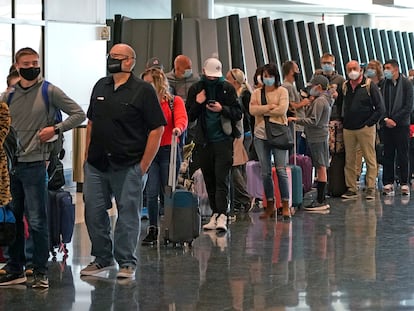
US loosens travel warnings for over 30 countries including Spain
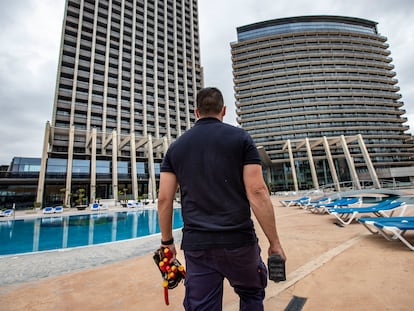
Closed hotels and deserted streets: the unrecognizable face of Spain’s tourism industry
- Francés online
- Inglés online
- Italiano online
- Alemán online
- Crucigramas & Juegos

Cookies on GOV.UK
We use some essential cookies to make this website work.
We’d like to set additional cookies to understand how you use GOV.UK, remember your settings and improve government services.
We also use cookies set by other sites to help us deliver content from their services.
You have accepted additional cookies. You can change your cookie settings at any time.
You have rejected additional cookies. You can change your cookie settings at any time.
- Passports, travel and living abroad
- Travel abroad
- Foreign travel advice
Warnings and insurance
The Foreign, Commonwealth & Development Office (FCDO) provides advice about risks of travel to help British nationals make informed decisions. Find out more about FCDO travel advice .
Before you travel
No travel can be guaranteed safe. Read all the advice in this guide and any specific travel advice that applies to you:
- women travellers
- disabled travellers
- LGBT+ travellers
Follow and contact FCDO travel on Twitter , Facebook and Instagram . You can also sign up to get email notifications when this advice is updated.
Travel insurance
If you choose to travel, research your destinations and get appropriate travel insurance . Insurance should cover your itinerary, planned activities and expenses in an emergency.
Related content
Is this page useful.
- Yes this page is useful
- No this page is not useful
Help us improve GOV.UK
Don’t include personal or financial information like your National Insurance number or credit card details.
To help us improve GOV.UK, we’d like to know more about your visit today. We’ll send you a link to a feedback form. It will take only 2 minutes to fill in. Don’t worry we won’t send you spam or share your email address with anyone.
- Search Please fill out this field.
- Manage Your Subscription
- Give a Gift Subscription
- Sweepstakes
Spain Lifts Vaccine Requirement for American Travelers — What to Know
Unvaccinated travelers will now be able to visit Spain with a negative COVID-19 test.
:max_bytes(150000):strip_icc():format(webp)/alison-fox-author-pic-15f25761041b477aaf424ceca6618580.jpg)
Spain eased restrictions for unvaccinated travelers from outside the European Union on Monday, including from the United States, according to the government.
The new rules, which allow unvaccinated travelers to visit with proof of a negative test, will allow American travelers to enter under the same conditions currently afforded to citizens of EU and Schengen countries, according to the Ministry of Industry, Commerce and Tourism .
Previously, Spain required American travelers to show proof of vaccination and proof of a booster shot if it had been more than 270 days (about 9 months) since the last dose of their initial vaccine series.
"The new phase of the pandemic allows us to relax the health requirements for entry to Spain, equating non-EU travelers with those from the EU and associated Schengen countries," Reyes Maroto, the country's minister of industry, commerce and tourism, said in a statement. "This excellent news… will make it easier for tourists from outside Europe to visit us this high season, guaranteeing safe mobility.
" Spain is emerging as one of the most desired destinations in the world, as shown by the demand indicators that month after month are approaching pre-pandemic levels and this measure will speed up the recovery of the sector by facilitating the entry of international travellers," she added.
Going forward, unvaccinated travelers will be allowed to enter the country by showing proof of a negative COVID-19 PCR test taken within 72 hours of their departure or proof of a negative rapid antigen test taken within 24 hours of their departure, according to the ministry.
Travelers can still enter Spain with proof of vaccination or proof they contracted COVID-19 and recovered within 6 months. Children under 12 are exempt from showing any vaccination or test certificates.
All U.S. travelers must also fill out a SPTH Health Control form .
The relaxed rules come ahead of Spain's busy summer tourism season when travelers descend on its gorgeous beaches and amazing nightlife .
Alison Fox is a contributing writer for Travel + Leisure. When she's not in New York City, she likes to spend her time at the beach or exploring new destinations and hopes to visit every country in the world. Follow her adventures on Instagram .
Can Americans travel to Spain? Yes, if you've gotten the COVID-19 vaccine
MADRID — Spain jump-started its summer tourism season on Monday by welcoming vaccinated visitors from most countries as well as European visitors who can prove they are not infected with coronavirus. It also reopened its ports to cruise ship stops.
Vaccinated Americans may travel from the U.S. to Spain if they present a QR code from the Spain Travel Health portal and a vaccination certificate proving they were vaccinated at least 14 days before arrival. U.S. children under age 6 don't need any special requirements to enter the country with their vaccinated parents. However, children age 6 and up will need their own vaccination certificate or negative results from a COVID-19 test taken within 48 hours before arriving in Spain. Alternately, a medical certificate showing recovery from COVID-19 would also be accepted.
► Have COVID vaccine, will travel: These are the countries open to fully vaccinated Americans
► Vaccine passports: What to know about the ones being tested for international travel
The U.S. Embassy & Consulate in Spain and Andorra did not have any immediate details on which specific certificates would be accepted but referred travelers to the Spain Health Portal. The portal notes that even with certificates, travelers may be required to undergo COVID-19 testing upon arrival in Spain, if health officials determine a need.
Learn more: Best travel insurance
Tourists can also visit travelsafe.spain.info for more information .
The vaccines accepted are those approved by Europe’s drug regulator — Pfizer-BioNTech, Moderna, AstraZeneca and Johnson & Johnson — as well as two Chinese vaccines authorized by the World Health Organization, Sinopharm and Sinovac.
Non-vaccinated travelers from the European Union's 27 countries can enter Spain with negative results of recent antigen tests, which are cheaper and faster than PCR tests for coronavirus .
Spain is still banning nonessential travel from Brazil, India and South Africa , where coronavirus variants have been been a major source of concern.
The Spanish government has set a goal of receiving between 14.5 million to 15.5 million visitors between July and September. That's about 40% of the tourists in the same period of 2019 but twice as many as last summer, when only EU visitors could enter Spain.
Tourism is a major industry that in 2019 accounted for over 12% of Spain's GDP.
►France reopening to vaccinated Americans: What travelers need to visit France starting June 9
►'Hot spots still a little too hot': More than half of Americans won't consider international travel as countries reopen
In another move to boost tourism, Spanish ports opened to cruise ships on Monday, nearly 15 months after they were banned as the first coronavirus outbreaks were detected.
After peaking in late January at nearly 900 new cases per 100,000 residents in 14-days, the coronavirus contagion indicator in Spain has dropped to 117 per 100,000. Still, its descent has stalled in the past days as new infections are spreading among unvaccinated groups.
Spain has counted over 80,000 COVID-19 deaths in the pandemic.
Contributing: Eve Chen, USA TODAY
You are using an outdated browser. Upgrade your browser today or install Google Chrome Frame to better experience this site.
Spain Traveler View
Travel health notices, vaccines and medicines, non-vaccine-preventable diseases, stay healthy and safe.
- Packing List
After Your Trip
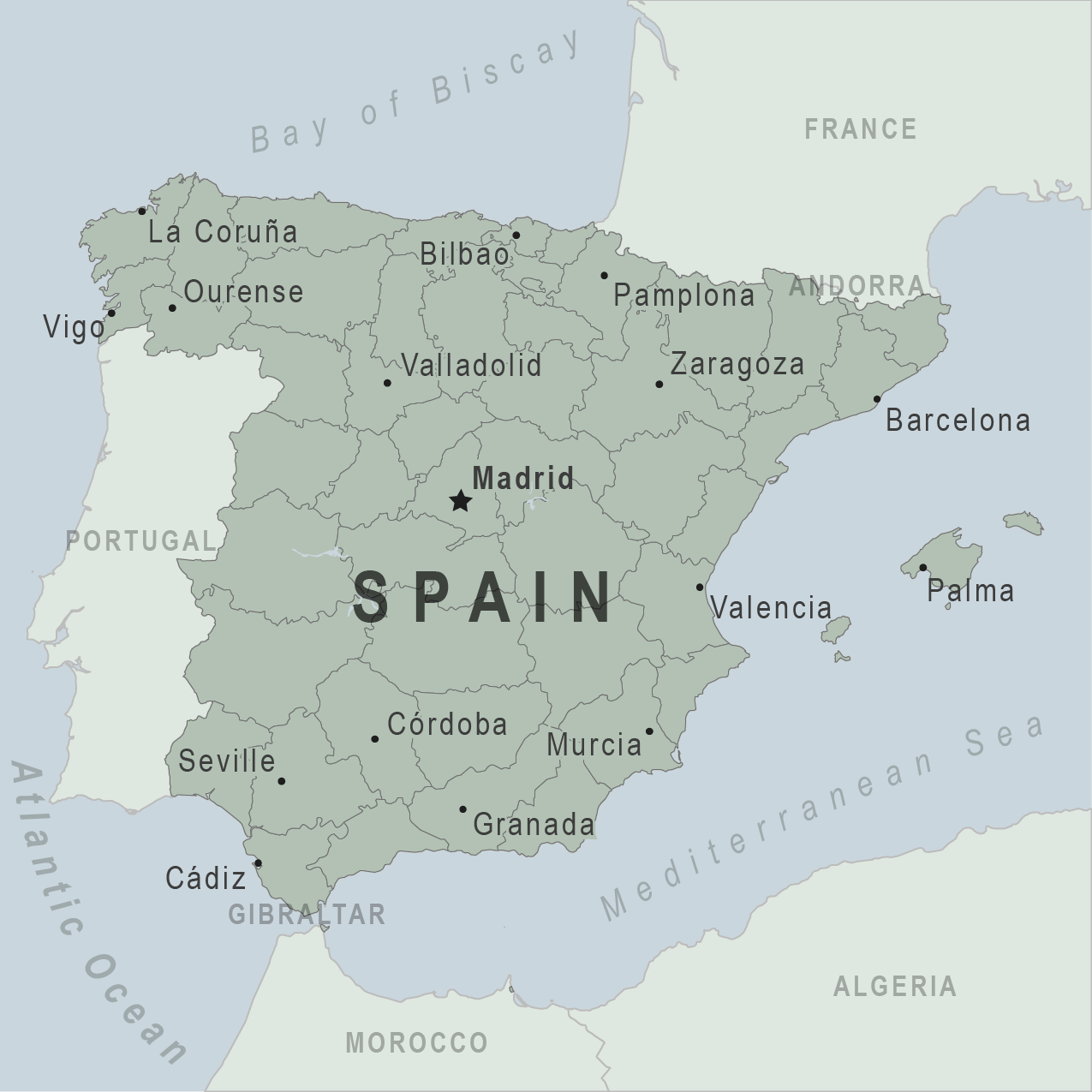
There are no notices currently in effect for Spain.
⇧ Top
Check the vaccines and medicines list and visit your doctor at least a month before your trip to get vaccines or medicines you may need. If you or your doctor need help finding a location that provides certain vaccines or medicines, visit the Find a Clinic page.
Routine vaccines
Recommendations.
Make sure you are up-to-date on all routine vaccines before every trip. Some of these vaccines include
- Chickenpox (Varicella)
- Diphtheria-Tetanus-Pertussis
- Flu (influenza)
- Measles-Mumps-Rubella (MMR)
Immunization schedules
All eligible travelers should be up to date with their COVID-19 vaccines. Please see Your COVID-19 Vaccination for more information.
COVID-19 vaccine
Hepatitis A
Consider hepatitis A vaccination for most travelers. It is recommended for travelers who will be doing higher risk activities, such as visiting smaller cities, villages, or rural areas where a traveler might get infected through food or water. It is recommended for travelers who plan on eating street food.
Hepatitis A - CDC Yellow Book
Dosing info - Hep A
Hepatitis B
Recommended for unvaccinated travelers younger than 60 years old traveling to Spain. Unvaccinated travelers 60 years and older may get vaccinated before traveling to Spain.
Hepatitis B - CDC Yellow Book
Dosing info - Hep B
Cases of measles are on the rise worldwide. Travelers are at risk of measles if they have not been fully vaccinated at least two weeks prior to departure, or have not had measles in the past, and travel internationally to areas where measles is spreading.
All international travelers should be fully vaccinated against measles with the measles-mumps-rubella (MMR) vaccine, including an early dose for infants 6–11 months, according to CDC’s measles vaccination recommendations for international travel .
Measles (Rubeola) - CDC Yellow Book
Spain is free of dog rabies. However, rabies may still be present in wildlife species, particularly bats. CDC recommends rabies vaccination before travel only for people working directly with wildlife. These people may include veterinarians, animal handlers, field biologists, or laboratory workers working with specimens from mammalian species.
Rabies - CDC Yellow Book
Avoid contaminated water
Leptospirosis
How most people get sick (most common modes of transmission)
- Touching urine or other body fluids from an animal infected with leptospirosis
- Swimming or wading in urine-contaminated fresh water, or contact with urine-contaminated mud
- Drinking water or eating food contaminated with animal urine
- Avoid contaminated water and soil
Clinical Guidance
Avoid bug bites.
Leishmaniasis
- Sand fly bite
- Avoid Bug Bites
Airborne & droplet
- Breathing in air or accidentally eating food contaminated with the urine, droppings, or saliva of infected rodents
- Bite from an infected rodent
- Less commonly, being around someone sick with hantavirus (only occurs with Andes virus)
- Avoid rodents and areas where they live
- Avoid sick people
Tuberculosis (TB)
- Breathe in TB bacteria that is in the air from an infected and contagious person coughing, speaking, or singing.
Learn actions you can take to stay healthy and safe on your trip. Vaccines cannot protect you from many diseases in Spain, so your behaviors are important.
Eat and drink safely
Food and water standards around the world vary based on the destination. Standards may also differ within a country and risk may change depending on activity type (e.g., hiking versus business trip). You can learn more about safe food and drink choices when traveling by accessing the resources below.
- Choose Safe Food and Drinks When Traveling
- Water Treatment Options When Hiking, Camping or Traveling
- Global Water, Sanitation and Hygiene | Healthy Water
- Avoid Contaminated Water During Travel
You can also visit the Department of State Country Information Pages for additional information about food and water safety.
Prevent bug bites
Although Spain is an industrialized country, bug bites here can still spread diseases. Just as you would in the United States, try to avoid bug bites while spending time outside or in wooded areas.
What can I do to prevent bug bites?
- Cover exposed skin by wearing long-sleeved shirts, long pants, and hats.
- Use an appropriate insect repellent (see below).
- Consider using permethrin-treated clothing and gear if spending a lot of time outside. Do not use permethrin directly on skin.
What type of insect repellent should I use?
- FOR PROTECTION AGAINST TICKS AND MOSQUITOES: Use a repellent that contains 20% or more DEET for protection that lasts up to several hours.
- Picaridin (also known as KBR 3023, Bayrepel, and icaridin)
- Oil of lemon eucalyptus (OLE) or para-menthane-diol (PMD)
- 2-undecanone
- Always use insect repellent as directed.
What should I do if I am bitten by bugs?
- Avoid scratching bug bites, and apply hydrocortisone cream or calamine lotion to reduce the itching.
- Check your entire body for ticks after outdoor activity. Be sure to remove ticks properly.
What can I do to avoid bed bugs?
Although bed bugs do not carry disease, they are an annoyance. See our information page about avoiding bug bites for some easy tips to avoid them. For more information on bed bugs, see Bed Bugs .
For more detailed information on avoiding bug bites, see Avoid Bug Bites .
Stay safe outdoors
If your travel plans in Spain include outdoor activities, take these steps to stay safe and healthy during your trip:
- Stay alert to changing weather conditions and adjust your plans if conditions become unsafe.
- Prepare for activities by wearing the right clothes and packing protective items, such as bug spray, sunscreen, and a basic first aid kit.
- Consider learning basic first aid and CPR before travel. Bring a travel health kit with items appropriate for your activities.
- If you are outside for many hours in the heat, eat salty snacks and drink water to stay hydrated and replace salt lost through sweating.
- Protect yourself from UV radiation : use sunscreen with an SPF of at least 15, wear protective clothing, and seek shade during the hottest time of day (10 a.m.–4 p.m.).
- Be especially careful during summer months and at high elevation. Because sunlight reflects off snow, sand, and water, sun exposure may be increased during activities like skiing, swimming, and sailing.
- Very cold temperatures can be dangerous. Dress in layers and cover heads, hands, and feet properly if you are visiting a cold location.
Stay safe around water
- Swim only in designated swimming areas. Obey lifeguards and warning flags on beaches.
- Do not dive into shallow water.
- Avoid swallowing water when swimming. Untreated water can carry germs that make you sick.
- Practice safe boating—follow all boating safety laws, do not drink alcohol if you are driving a boat, and always wear a life jacket.
Keep away from animals
Most animals avoid people, but they may attack if they feel threatened, are protecting their young or territory, or if they are injured or ill. Animal bites and scratches can lead to serious diseases such as rabies.
Follow these tips to protect yourself:
- Do not touch or feed any animals you do not know.
- Do not allow animals to lick open wounds, and do not get animal saliva in your eyes or mouth.
- Avoid rodents and their urine and feces.
- Traveling pets should be supervised closely and not allowed to come in contact with local animals.
- If you wake in a room with a bat, seek medical care immediately. Bat bites may be hard to see.
All animals can pose a threat, but be extra careful around dogs, bats, monkeys, sea animals such as jellyfish, and snakes. If you are bitten or scratched by an animal, immediately:
- Wash the wound with soap and clean water.
- Go to a doctor right away.
- Tell your doctor about your injury when you get back to the United States.
Reduce your exposure to germs
Follow these tips to avoid getting sick or spreading illness to others while traveling:
- Wash your hands often, especially before eating.
- If soap and water aren’t available, clean hands with hand sanitizer (containing at least 60% alcohol).
- Don’t touch your eyes, nose, or mouth. If you need to touch your face, make sure your hands are clean.
- Cover your mouth and nose with a tissue or your sleeve (not your hands) when coughing or sneezing.
- Try to avoid contact with people who are sick.
- If you are sick, stay home or in your hotel room, unless you need medical care.
Avoid sharing body fluids
Diseases can be spread through body fluids, such as saliva, blood, vomit, and semen.
Protect yourself:
- Use latex condoms correctly.
- Do not inject drugs.
- Limit alcohol consumption. People take more risks when intoxicated.
- Do not share needles or any devices that can break the skin. That includes needles for tattoos, piercings, and acupuncture.
- If you receive medical or dental care, make sure the equipment is disinfected or sanitized.
Know how to get medical care while traveling
Plan for how you will get health care during your trip, should the need arise:
- Carry a list of local doctors and hospitals at your destination.
- Review your health insurance plan to determine what medical services it would cover during your trip. Consider purchasing travel health and medical evacuation insurance for things your regular insurance will not cover.
- Carry a card that identifies, in the local language, your blood type, chronic conditions or serious allergies, and the generic names of any medicines you take.
- Bring copies of your prescriptions for medicine and for eye glasses and contact lenses.
- Some prescription drugs may be illegal in other countries. Call Spain’s embassy to verify that all of your prescription(s) are legal to bring with you.
- Bring all the medicines (including over-the-counter medicines) you think you might need during your trip, including extra in case of travel delays. Ask your doctor to help you get prescriptions filled early if you need to.
Many foreign hospitals and clinics are accredited by the Joint Commission International. A list of accredited facilities is available at their website ( www.jointcommissioninternational.org ).
Select safe transportation
Motor vehicle crashes are the #1 killer of healthy US citizens in foreign countries.
Be smart when you are traveling on foot.
- Use sidewalks and marked crosswalks.
- Pay attention to the traffic around you, especially in crowded areas.
- Remember, people on foot do not always have the right of way in other countries.
Riding/Driving
Choose a safe vehicle.
- Choose official taxis or public transportation, such as trains and buses.
- Make sure there are seatbelts.
- Avoid overcrowded, overloaded, top-heavy buses and minivans.
- Avoid riding on motorcycles or motorbikes, especially motorbike taxis. (Many crashes are caused by inexperienced motorbike drivers.)
- Choose newer vehicles—they may have more safety features, such as airbags, and be more reliable.
- Choose larger vehicles, which may provide more protection in crashes.
Think about the driver.
- Do not drive after drinking alcohol or ride with someone who has been drinking.
- Consider hiring a licensed, trained driver familiar with the area.
- Arrange payment before departing.
Follow basic safety tips.
- Wear a seatbelt at all times.
- Sit in the back seat of cars and taxis.
- When on motorbikes or bicycles, always wear a helmet. (Bring a helmet from home, if needed.)
- Do not use a cell phone or text while driving (illegal in many countries).
- Travel during daylight hours only, especially in rural areas.
- If you choose to drive a vehicle in Spain, learn the local traffic laws and have the proper paperwork.
- Get any driving permits and insurance you may need. Get an International Driving Permit (IDP). Carry the IDP and a US-issued driver's license at all times.
- Check with your auto insurance policy's international coverage, and get more coverage if needed. Make sure you have liability insurance.
- Avoid using local, unscheduled aircraft.
- If possible, fly on larger planes (more than 30 seats); larger airplanes are more likely to have regular safety inspections.
- Try to schedule flights during daylight hours and in good weather.
Helpful Resources
Road Safety Overseas (Information from the US Department of State): Includes tips on driving in other countries, International Driving Permits, auto insurance, and other resources.
The Association for International Road Travel has country-specific Road Travel Reports available for most countries for a minimal fee.
Maintain personal security
Use the same common sense traveling overseas that you would at home, and always stay alert and aware of your surroundings.
Before you leave
- Research your destination(s), including local laws, customs, and culture.
- Monitor travel advisories and alerts and read travel tips from the US Department of State.
- Enroll in the Smart Traveler Enrollment Program (STEP) .
- Leave a copy of your itinerary, contact information, credit cards, and passport with someone at home.
- Pack as light as possible, and leave at home any item you could not replace.
While at your destination(s)
- Carry contact information for the nearest US embassy or consulate .
- Carry a photocopy of your passport and entry stamp; leave the actual passport securely in your hotel.
- Follow all local laws and social customs.
- Do not wear expensive clothing or jewelry.
- Always keep hotel doors locked, and store valuables in secure areas.
- If possible, choose hotel rooms between the 2nd and 6th floors.
Healthy Travel Packing List
Use the Healthy Travel Packing List for Spain for a list of health-related items to consider packing for your trip. Talk to your doctor about which items are most important for you.
Why does CDC recommend packing these health-related items?
It’s best to be prepared to prevent and treat common illnesses and injuries. Some supplies and medicines may be difficult to find at your destination, may have different names, or may have different ingredients than what you normally use.
If you are not feeling well after your trip, you may need to see a doctor. If you need help finding a travel medicine specialist, see Find a Clinic . Be sure to tell your doctor about your travel, including where you went and what you did on your trip. Also tell your doctor if you were bitten or scratched by an animal while traveling.
For more information on what to do if you are sick after your trip, see Getting Sick after Travel .
Map Disclaimer - The boundaries and names shown and the designations used on maps do not imply the expression of any opinion whatsoever on the part of the Centers for Disease Control and Prevention concerning the legal status of any country, territory, city or area or of its authorities, or concerning the delimitation of its frontiers or boundaries. Approximate border lines for which there may not yet be full agreement are generally marked.
Other Destinations
If you need help finding travel information:
Message & data rates may apply. CDC Privacy Policy
File Formats Help:
- Adobe PDF file
- Microsoft PowerPoint file
- Microsoft Word file
- Microsoft Excel file
- Audio/Video file
- Apple Quicktime file
- RealPlayer file
- Zip Archive file
Exit Notification / Disclaimer Policy
- The Centers for Disease Control and Prevention (CDC) cannot attest to the accuracy of a non-federal website.
- Linking to a non-federal website does not constitute an endorsement by CDC or any of its employees of the sponsors or the information and products presented on the website.
- You will be subject to the destination website's privacy policy when you follow the link.
- CDC is not responsible for Section 508 compliance (accessibility) on other federal or private website.
- Skip to main content
- Skip to "About this site"
Language selection
Search travel.gc.ca.
Help us to improve our website. Take our survey !
COVID-19: travel health notice for all travellers
Spain travel advice
Latest updates: The Need help? section was updated.
Last updated: April 11, 2024 07:18 ET
On this page
Safety and security, entry and exit requirements, laws and culture, natural disasters and climate, spain - exercise a high degree of caution.
Exercise a high degree of caution in Spain due to the threat of terrorism
Back to top
Petty crime
Petty crime, such as pickpocketing and purse snatching, is common. It’s most prevalent in larger cities and particularly during holidays, festivals and weekends.
Thieves work alone or in groups and may use various techniques to distract you and steal your belongings, such as asking for directions or informing you of a stain on your clothes.
Individuals posing as plainclothes police officers may ask to see your passport, IDs or wallets. In this situation, politely ask to see their official identification badge to verify that the request is legitimate.
Thieves are especially active in crowded areas, such as:
- airports and public transportation facilities
- hotel lobbies
- restaurants, patios and outdoor cafés
- tourist attractions
In Madrid, thieves are particularly active in the following areas:
- Atocha train station
- Gran Vía
- Plaza Cibeles and Paseo del Prado
- Puerta del Sol area, Plaza Mayor and surrounding streets
- Retiro park
- the subway system
There has been a significant increase in stolen passports in the Barcelona region during the last few years.
In Barcelona, thieves are particularly active in the following areas:
- Barceloneta beach
- El-Prat airport and on the airport shuttle bus (the Aerobus)
- Güell park
- Las Ramblas, including in Internet cafés
- Passeig de Gràcia
- Plaça de Catalunya
- Plaça Reial and surrounding streets of the old city (Ciutat Vella
- Sagrada Família Basilica
- Sants train and bus station
Useful links
- Security advice while in Catalonia - Mossos d’Esquadra
- Tips to stay safe - Municipality of Barcelona
While in Spain:
- ensure that your belongings, including your passport and other travel documents, are secure at all times
- carry a photocopy or digital copy of your passport identification page, driver’s licence, train or airline tickets and credit cards
- at the beach, bring only the essentials
- expect travel delays and additional expenses if your passport is stolen
- don’t leave luggage unattended at airport check-in or ticket counters, car rental desks or hotel lobbies
- avoid frequenting unlit areas
Violent crime
Violent crime is rare but does occur. Home burglaries happen in larger cities and coastal areas and sometimes affect homes or vacation rental apartments offered through online accommodation apps.
On the road
Thieves have been known to simulate or provoke road-related incidents, such as flat tires. When a motorist stops to help, the thieves steal the motorist’s car or belongings. The reverse scenario has also occurred, whereby a thief offers to help a motorist in distress and steals the motorist’s car or belongings.
In the event of a road-related incident, be extremely cautious about accepting help from anyone other than a uniformed officer from the National Police Corps or Civil Guard.
There is also a high threat of theft from rental and parked vehicles.
- Be particularly vigilant in service areas on coastal highways
- Use secure parking facilities
- Avoid leaving any luggage or valuables in the vehicle
- Always lock your doors and keep windows closed
Foreign Tourist Assistance Service
Several municipalities have dedicated police units for foreign tourists (SATE) and offer services in English and other languages.
You can also call the tourist hotline to file a police report with the assistance of a translator.
- Safety tips for tourists - Policía Nacional
- Foreign Tourist Assistance Service (SATE) in Madrid - Tourism Madrid
- Tourist Assistance Service in Barcelona (Ciutat Vella District) - Guàrdia Urbana de Barcelona
- Foreign Tourist Assistance Service (SATE) in Málaga - Tourism Málaga
- Hotline service to file a police report with a translator - Policía Nacional
There is a threat of terrorism in Europe. Terrorists have carried out attacks in several European cities.
In Spain, attacks causing deaths and injuries have taken place. Further attacks in Spain cannot be ruled out. Further attacks elsewhere in Europe are likely.
Targets could include:
- government buildings, including schools
- places of worship
- airports and other transportation hubs and networks
- public areas such as tourist attractions, restaurants, bars, coffee shops, shopping centres, markets, hotels and other sites frequented by foreigners
Always be aware of your surroundings when in public places. Be particularly vigilant if attending sporting events and during religious holidays and other public celebrations, as terrorists have used such occasions to mount attacks.
The Spanish government maintains a public alert system on terrorism and communicates threat level changes online and through local media. The current threat level for Spain is level 4 (“high”) on a scale of 5.
Terrorism threat level - Spanish Ministry of the Interior (in Spanish)
Internet scams
Unsolicited emails offering enticing business or financial opportunities are most likely fraudulent.
These emails may involve the following scenarios:
- prizes won in the Spanish lottery (el Gordo)
- inheritance
- a friend or family member who appears to be in distress abroad
Never send funds to an unknown individual. Don’t travel to Spain to obtain restitution after losing money to a scam.
Romance scams
If you’re travelling to Spain to meet someone you’ve otherwise only met online, you may be the victim of a scam. Be wary of attempts at fraud by persons who profess friendship or romantic interest over the internet.
Investment scams
If you plan to buy a property or make other investments in Spain, seek legal advice in Canada and Spain. Do so before making commitments. Related disputes could take time and be costly to resolve.
Credit card and ATM fraud
Credit card and ATM fraud occurs.
When using debit or credit cards:
- pay careful attention if other people are handling your cards
- use ATMs located in public areas or inside a bank or business
- avoid using card readers with an irregular or unusual feature
- cover the keypad with one hand when entering your PIN
- check for any unauthorized transaction on your account statements
Overseas fraud
Spiked food and drinks
Never leave food or drinks unattended or in the care of strangers. Be wary of accepting snacks, beverages, gum or cigarettes from new acquaintances, as the items may contain drugs that could put you at risk of sexual assault and robbery.
Demonstrations and strikes
Demonstrations and strikes occur regularly. They also take place sporadically in Catalonia, including in Barcelona, in response to political events. Violent clashes between demonstrators and police have taken place.
Even peaceful demonstrations can turn violent at any time. They can also lead to traffic and public transportation disruptions, including access to roads, airports, and the railway and metro systems. Flight delays or cancellations, as well as disruptions at ports, are also possible.
- Avoid areas where demonstrations and large gatherings are taking place
- Follow the instructions of local authorities
- Monitor local media for information on ongoing demonstrations
- Be prepared to change your travel plans on short notice
Mass gatherings (large-scale events)
Swimming and water activities
Coastal waters can be dangerous. Always obey warning flags at beaches, lakes and rivers.
The main warning flags used in Spain are:
- Green: calm waters, swimming is allowed
- Yellow: agitated waters, swimming with precautions is recommended
- Red: dangerous waters, swimming or entering the water is forbidden
- Black: contaminated waters, avoid swimming
In marine areas, coral, jellyfish and other ocean life found along reefs can poison, sting or cause infection if touched or stepped on.
- Ask local authorities about the presence of such species and whether they are dangerous
- Immediately seek medical assistance if you get hurt
In the fall and winter months, be cautious when walking along beaches close to the water’s edge as waves can be unpredictable in size and may come onto shore further than expected.
- Don’t visit beaches or coastal areas during periods of severe weather warnings
- Look out for signs warning of cliff erosion and falling rocks
- Don’t dive into unknown waters, as hidden rocks or shallow depths can cause serious injury or death
- Exercise caution and follow the advice of the local authorities
Water safety abroad
Mountain activities
If you intend to do mountaineering or skiing:
- never do so alone and always hire an experienced guide from a reputable company
- buy travel insurance that includes helicopter rescue and medical evacuation
- ensure that your physical condition is good enough to meet the challenges of your activity
- ensure that you’re adequately equipped and well informed about weather and other conditions that may pose a hazard
- inform a family member or friend of your itinerary, including when you expect to be back
- know the symptoms of acute altitude sickness, which can be fatal
- obtain detailed information on trekking routes or ski slopes before setting out and do not venture off marked trails or slopes
Road safety
Road conditions and road safety can vary throughout the country. Some drivers are aggressive and drive at excessive speeds.
Travellers may experience delays crossing between Spain and Gibraltar due to increased border controls.
- Be sure you are prepared for lengthy delays
- Plan for an adequate supply of fuel, food, and water
We do not make assessments on the compliance of foreign domestic airlines with international safety standards.
Information about foreign domestic airlines
Every country or territory decides who can enter or exit through its borders. The Government of Canada cannot intervene on your behalf if you do not meet your destination’s entry or exit requirements.
We have obtained the information on this page from the Spanish authorities. It can, however, change at any time.
Verify this information with the Foreign Representatives in Canada .
- Schengen area
Spain is a Schengen area country. Canadian citizens do not need a visa for travel to countries within the Schengen area. However, visa-free travel only applies to stays of up to 90 days in any 180-day period. Stays are cumulative and include visits to any Schengen area country.
If you plan to stay in the Schengen area for a longer period of time, you will need a visa. You must contact the high commission or embassy of the country or countries you are travelling to and obtain the appropriate visa(s) prior to travel.
- Foreign Representatives in Canada
Entry requirements vary depending on the type of passport you use for travel.
Before you travel, check with your transportation company about passport requirements. Its rules on passport validity may be more stringent than the country’s entry rules.
Regular Canadian passport
Your passport must be valid for at least 3 months beyond the date you expect to leave the Schengen area.
Passport for official travel
Different entry rules may apply.
Official travel
Passport with “X” gender identifier
While the Government of Canada issues passports with an “X” gender identifier, it cannot guarantee your entry or transit through other countries. You might face entry restrictions in countries that do not recognize the “X” gender identifier. Before you leave, check with the closest foreign representative for your destination.
Other travel documents
Different entry rules may apply when travelling with a temporary passport or an emergency travel document. Before you leave, check with the closest foreign representative for your destination.
- Foreign Representatives in Canada
- Canadian passports
Tourist visa: not required for stays up to 90 days in any 180-day period Business visa: not required Student visa: required
Other entry requirements
Customs officials may ask you to show them a return or onward ticket and proof of sufficient funds to cover your stay.
Children and travel
Learn more about travelling with children .
Yellow fever
Learn about potential entry requirements related to yellow fever (vaccines section).
Relevant Travel Health Notices
- Global Measles Notice - 13 March, 2024
- COVID-19 and International Travel - 13 March, 2024
This section contains information on possible health risks and restrictions regularly found or ongoing in the destination. Follow this advice to lower your risk of becoming ill while travelling. Not all risks are listed below.
Consult a health care professional or visit a travel health clinic preferably 6 weeks before you travel to get personalized health advice and recommendations.
Routine vaccines
Be sure that your routine vaccinations , as per your province or territory , are up-to-date before travelling, regardless of your destination.
Some of these vaccinations include measles-mumps-rubella (MMR), diphtheria, tetanus, pertussis, polio, varicella (chickenpox), influenza and others.
Pre-travel vaccines and medications
You may be at risk for preventable diseases while travelling in this destination. Talk to a travel health professional about which medications or vaccines may be right for you, based on your destination and itinerary.
Yellow fever is a disease caused by a flavivirus from the bite of an infected mosquito.
Travellers get vaccinated either because it is required to enter a country or because it is recommended for their protection.
- There is no risk of yellow fever in this country.
Country Entry Requirement*
- Proof of vaccination is not required to enter this country.
Recommendation
- Vaccination is not recommended.
* It is important to note that country entry requirements may not reflect your risk of yellow fever at your destination. It is recommended that you contact the nearest diplomatic or consular office of the destination(s) you will be visiting to verify any additional entry requirements.
About Yellow Fever
Yellow Fever Vaccination Centres in Canada
Measles is a highly contagious viral disease. It can spread quickly from person to person by direct contact and through droplets in the air.
Anyone who is not protected against measles is at risk of being infected with it when travelling internationally.
Regardless of where you are going, talk to a health care professional before travelling to make sure you are fully protected against measles.
Hepatitis B is a risk in every destination. It is a viral liver disease that is easily transmitted from one person to another through exposure to blood and body fluids containing the hepatitis B virus. Travellers who may be exposed to blood or other bodily fluids (e.g., through sexual contact, medical treatment, sharing needles, tattooing, acupuncture or occupational exposure) are at higher risk of getting hepatitis B.
Hepatitis B vaccination is recommended for all travellers. Prevent hepatitis B infection by practicing safe sex, only using new and sterile drug equipment, and only getting tattoos and piercings in settings that follow public health regulations and standards.
Coronavirus disease (COVID-19) is an infectious viral disease. It can spread from person to person by direct contact and through droplets in the air.
It is recommended that all eligible travellers complete a COVID-19 vaccine series along with any additional recommended doses in Canada before travelling. Evidence shows that vaccines are very effective at preventing severe illness, hospitalization and death from COVID-19. While vaccination provides better protection against serious illness, you may still be at risk of infection from the virus that causes COVID-19. Anyone who has not completed a vaccine series is at increased risk of being infected with the virus that causes COVID-19 and is at greater risk for severe disease when travelling internationally.
Before travelling, verify your destination’s COVID-19 vaccination entry/exit requirements. Regardless of where you are going, talk to a health care professional before travelling to make sure you are adequately protected against COVID-19.
The best way to protect yourself from seasonal influenza (flu) is to get vaccinated every year. Get the flu shot at least 2 weeks before travelling.
The flu occurs worldwide.
- In the Northern Hemisphere, the flu season usually runs from November to April.
- In the Southern Hemisphere, the flu season usually runs between April and October.
- In the tropics, there is flu activity year round.
The flu vaccine available in one hemisphere may only offer partial protection against the flu in the other hemisphere.
The flu virus spreads from person to person when they cough or sneeze or by touching objects and surfaces that have been contaminated with the virus. Clean your hands often and wear a mask if you have a fever or respiratory symptoms.
In this destination, rabies may be present in some wildlife species, including bats. Rabies is a deadly disease that spreads to humans primarily through bites or scratches from an infected animal.
If you are bitten or scratched by an animal while travelling, immediately wash the wound with soap and clean water and see a health care professional.
Before travel, discuss rabies vaccination with a health care professional. It may be recommended for travellers who will be working directly with wildlife.
Safe food and water precautions
Many illnesses can be caused by eating food or drinking beverages contaminated by bacteria, parasites, toxins, or viruses, or by swimming or bathing in contaminated water.
- Learn more about food and water precautions to take to avoid getting sick by visiting our eat and drink safely abroad page. Remember: Boil it, cook it, peel it, or leave it!
- Avoid getting water into your eyes, mouth or nose when swimming or participating in activities in freshwater (streams, canals, lakes), particularly after flooding or heavy rain. Water may look clean but could still be polluted or contaminated.
- Avoid inhaling or swallowing water while bathing, showering, or swimming in pools or hot tubs.
Insect bite prevention
Many diseases are spread by the bites of infected insects such as mosquitoes, ticks, fleas or flies. When travelling to areas where infected insects may be present:
- Use insect repellent (bug spray) on exposed skin
- Cover up with light-coloured, loose clothes made of tightly woven materials such as nylon or polyester
- Minimize exposure to insects
- Use mosquito netting when sleeping outdoors or in buildings that are not fully enclosed
To learn more about how you can reduce your risk of infection and disease caused by bites, both at home and abroad, visit our insect bite prevention page.
Find out what types of insects are present where you’re travelling, when they’re most active, and the symptoms of the diseases they spread.
- In this country, risk of dengue is sporadic. It is a viral disease spread to humans by mosquito bites.
- Dengue can cause flu-like symptoms. In some cases, it can lead to severe dengue, which can be fatal.
- The level of risk of dengue changes seasonally, and varies from year to year. The level of risk also varies between regions in a country and can depend on the elevation in the region.
- Mosquitoes carrying dengue typically bite during the daytime, particularly around sunrise and sunset.
- Protect yourself from mosquito bites . There is no vaccine or medication that protects against dengue fever.
Animal precautions
Some infections, such as rabies and influenza, can be shared between humans and animals. Certain types of activities may increase your chance of contact with animals, such as travelling in rural or forested areas, camping, hiking, and visiting wet markets (places where live animals are slaughtered and sold) or caves.
Travellers are cautioned to avoid contact with animals, including dogs, livestock (pigs, cows), monkeys, snakes, rodents, birds, and bats, and to avoid eating undercooked wild game.
Closely supervise children, as they are more likely to come in contact with animals.
Human cases of avian influenza have been reported in this destination. Avian influenza is a viral infection that can spread quickly and easily among birds and in rare cases it can infect mammals, including people. The risk is low for most travellers.
Avoid contact with birds, including wild, farm, and backyard birds (alive or dead) and surfaces that may have bird droppings on them. Ensure all poultry dishes, including eggs and wild game, are properly cooked.
Travellers with a higher risk of exposure include those:
- visiting live bird/animal markets or poultry farms
- working with poultry (such as chickens, turkeys, domestic ducks)
- hunting, de-feathering, field dressing and butchering wild birds and wild mammals
- working with wild birds for activities such as research, conservation, or rehabilitation
- working with wild mammals, especially those that eat wild birds (e.g., foxes)
All eligible people are encouraged to get the seasonal influenza shot, which will protect them against human influenza viruses. While the seasonal influenza shot does not prevent infection with avian influenza, it can reduce the chance of getting sick with human and avian influenza viruses at the same time.
Person-to-person infections
Stay home if you’re sick and practise proper cough and sneeze etiquette , which includes coughing or sneezing into a tissue or the bend of your arm, not your hand. Reduce your risk of colds, the flu and other illnesses by:
- washing your hands often
- avoiding or limiting the amount of time spent in closed spaces, crowded places, or at large-scale events (concerts, sporting events, rallies)
- avoiding close physical contact with people who may be showing symptoms of illness
Sexually transmitted infections (STIs) , HIV , and mpox are spread through blood and bodily fluids; use condoms, practise safe sex, and limit your number of sexual partners. Check with your local public health authority pre-travel to determine your eligibility for mpox vaccine.
Medical services and facilities
Health care is excellent. Service is available throughout the country but may be limited in certain rural areas.
Private healthcare is also widely available. Upfront payment may be required.
Make sure you get travel insurance that includes coverage for medical evacuation and hospital stays.
Travel health and safety
Keep in Mind...
The decision to travel is the sole responsibility of the traveller. The traveller is also responsible for his or her own personal safety.
Be prepared. Do not expect medical services to be the same as in Canada. Pack a travel health kit , especially if you will be travelling away from major city centres.
water_restrictions_in_catalonia
Water restrictions in Catalonia
On February 1, 2024, the Government of Catalonia declared a state of emergency and imposed water restrictions due to drought. The restrictions affect 229 municipalities, including Barcelona. They include daily use limits and prohibit certain high-use activities.
- Confirm if water restrictions apply in your location
Information on water restrictions – Government of Catalonia (in Catalan)
You must abide by local laws.
Learn about what you should do and how we can help if you are arrested or detained abroad .
Transfer to a Canadian prison
Canada and Spain are signatories to the Convention on the Transfer of Sentenced Persons. This enables a Canadian imprisoned in Spain to request a transfer to a Canadian prison to complete a sentence. The transfer requires the agreement of both Canadian and Spain authorities.
This process can take a long time, and there is no guarantee that the transfer will be approved by either or both sides.
Identification
Local authorities may ask you to show ID at any time. You must carry an adequate ID, such as a passport, to show upon request. You could be detained until you can prove your identity.
Keep a photocopy or digital copy of your passport’s photo page in a safe place should your passport be lost or seized.
In Spain, foreign visitors must present a passport upon check-in at a hotel. Restaurants, hotels, shops and other such establishments also routinely request passports or other pieces of government-issued photo identification, such as a driver’s licence, to process credit card transactions.
- Don’t leave your passport or any other ID document with anyone
- Wait until they have taken the details or made a copy of it and have given the document back to you
Penalties for possession, use or trafficking of illegal drugs are severe. Convicted offenders can expect jail sentences or heavy fines.
In several autonomous regions and municipalities, including Madrid, Barcelona and the Balearic Islands, alcohol consumption in the street is prohibited. If you don’t comply, you could be fined.
Drugs, alcohol and travel
Photography
It is illegal to photograph military installations.
Some municipalities, including Barcelona, have banned beachwear outside of local beaches, including on beachfront promenades.
If caught, you could face on-the-spot fines.

Counterfeit merchandise
It is illegal in certain municipalities to buy counterfeit merchandise from street vendors, such as sunglasses or purses.
Local authorities may impose heavy fines on tourists caught buying counterfeit merchandise.
Dual citizenship
Dual citizenship is not legally recognized in Spain.
If local authorities consider you a citizen of Spain, they may refuse to grant you access to Canadian consular services. This will prevent us from providing you with those services.
Travellers with dual citizenship
International Child Abduction
The Hague Convention on the Civil Aspects of International Child Abduction is an international treaty. It can help parents with the return of children who have been removed to or retained in certain countries in violation of custody rights. The convention applies between Canada and Spain.
If your child was wrongfully taken to, or is being held in Spain, and if the applicable conditions are met, you may apply for the return of your child to the Spanish court.
If you are in this situation:
- act as quickly as you can
- contact the Central Authority for your province or territory of residence for information on starting an application under The Hague Convention
- consult a lawyer in Canada and in Spain to explore all the legal options for the return of your child
- report the situation to the nearest Canadian government office abroad or to the Vulnerable Children’s Consular Unit at Global Affairs Canada by calling the Emergency Watch and Response Centre
If your child was removed from a country other than Canada, consult a lawyer to determine if The Hague Convention applies.
Be aware that Canadian consular officials cannot interfere in private legal matters or in another country’s judicial affairs.
- List of Canadian Central Authorities for the Hague Convention
- International Child Abduction: A Guidebook for Left-Behind Parents
- Travelling with children
- The Hague Convention - Hague Conference on Private International Law
- Canadian embassies and consulates by destination
- Emergency Watch and Response Centre
You can drive in Spain with your valid Canadian driver’s licence and an international driving permit for up to 6 months. For stays longer than 6 months, you must obtain a local driver’s licence.
Vehicles must be equipped for emergency situations. You must carry the following items:
- 2 red warning triangles, of which one must be placed in front of the vehicle and one behind in case of accident or breakdown
- a reflective jacket, kept inside the car (not in the trunk), that you must wear when leaving a vehicle stranded or involved in a highway accident
- a spare tire and a repair kit
- a full set of spare light bulbs, plus the tools to change them
- snow chains if travelling in adverse winter conditions
You may be subject to on-the-spot fines if you fail to comply with these laws.
Emission zones
Certain cities have put in place low-emission or zero-emission zones (Zona de Bajas Emisiones [ZBE] and Area Central Cero Emisiones [ACCE]) to reduce air pollution. Access to these zones is restricted, and speed limits are lowered.
You may need to obtain a permit to prove that your vehicle responds to environmental standards.
- Driving in Spain - European Commission
- Obtaining a Spanish licence - General Traffic Directorate (in Spanish)
- More about the International Driving Permit
The currency of Spain is the euro (EUR).
If you are carrying €10,000 or more, or the equivalent in other currencies, you must make a declaration to customs when you enter or leave the European Union. It includes sums in:
- banknotes and coins
- bearer negotiable instruments such as cheques, travellers’ cheques, promissory notes and money orders
- bonds, shares
- gold coins with a gold content of at least 90 %
- gold bars, nuggets or clumps with a gold content of at least 99.5 %
- any other convertible asset
This does not apply if you are travelling within the European Union or in transit to a non-EU country.
EU cash controls - European Commission
Torrential rainfall and storms are common during the fall on the Mediterranean coast, particularly in the Valencian Community and the Balearic Islands.
Winter storms and heavy snowfall may also occur, particularly in northern and mountainous areas.
- Latest weather warnings - Spanish government’s meteorological agency
High temperatures create dry conditions, which can lead to large fires throughout Spain, particularly during summer. Fires can lead to railway and road closures, including major highways, and affect air traffic.
The air quality in areas near active fires may deteriorate due to heavy smoke and affect travellers with respiratory ailments.
In case of a major fire:
- avoid areas affected by active wildfires
- follow the instructions of local emergency services personnel, including any evacuation orders
- monitor local media sources for up-to-date information
Civil protection - Spanish Ministry of the Interior (in Spanish)
Mountainous areas
The weather in mountainous areas can be unpredictable. If you plan a mountain or skiing holiday, stay informed of the latest weather and safety conditions.
Hazardous winter conditions, such as heavy snowfall, blizzards and freezing temperatures, may put pilgrims at risk on the French route of St. James Way (“Camino de Santiago”). As a result, between November 1 and March 31, the East access through Navarra via Lepoeder is closed.
Follow signage and take the West route (Luzaide/Valcarlos) during this period.
- Weather forecast in the Pyrenees - Pyrenees reference centre for mountain risk management (A Lurte) (in Spanish)
- Way of St James through Navarra - Tourism Navarra
- Way of St James through Galicia - Tourism Galicia
Local services
Dial 112 for emergency assistance.
A hotline service to file a police report with a translator is available from 9 a.m. to 9 p.m. on weekdays.
Dial 902 102 112
The service is not available on weekends and public holidays.
Hotline service to file a police report with a translator - Policía Nacional
Consular assistance
Spain, Andorra, and Canary Islands
For emergency consular assistance, call the Embassy of Canada to Spain, in Madrid, and follow the instructions. At any time, you may also contact the Emergency Watch and Response Centre in Ottawa.
The decision to travel is your choice and you are responsible for your personal safety abroad. We take the safety and security of Canadians abroad very seriously and provide credible and timely information in our Travel Advice to enable you to make well-informed decisions regarding your travel abroad.
The content on this page is provided for information only. While we make every effort to give you correct information, it is provided on an "as is" basis without warranty of any kind, expressed or implied. The Government of Canada does not assume responsibility and will not be liable for any damages in connection to the information provided.
If you need consular assistance while abroad, we will make every effort to help you. However, there may be constraints that will limit the ability of the Government of Canada to provide services.
Learn more about consular services .
Risk Levels
take normal security precautions.
Take similar precautions to those you would take in Canada.
Exercise a high degree of caution
There are certain safety and security concerns or the situation could change quickly. Be very cautious at all times, monitor local media and follow the instructions of local authorities.
IMPORTANT: The two levels below are official Government of Canada Travel Advisories and are issued when the safety and security of Canadians travelling or living in the country or region may be at risk.
Avoid non-essential travel
Your safety and security could be at risk. You should think about your need to travel to this country, territory or region based on family or business requirements, knowledge of or familiarity with the region, and other factors. If you are already there, think about whether you really need to be there. If you do not need to be there, you should think about leaving.
Avoid all travel
You should not travel to this country, territory or region. Your personal safety and security are at great risk. If you are already there, you should think about leaving if it is safe to do so.
Advertisement
Spain Coronavirus Map and Case Count
The New York Times Updated March 10, 2023
- Share full article
Tracking Coronavirus in Spain: Latest Map and Case Count
New reported cases.
Vaccinations
Fully vaccinated.
See more details ›
Latest trends
- An average of 1,013 cases per day were reported in Spain in the last week. Cases have increased by 1 percent from the average two weeks ago. Deaths have decreased by 53 percent .
- Since the beginning of the pandemic, a total of 13,770,429 cases have been reported . At least 1 in 394 residents have died from the coronavirus, a total of 119,479 deaths .
- January 2022 was the month with the highest average cases, while April 2020 was the month with the highest average deaths in Spain.
Latest trends by region
This table is sorted by places with the most cases per 100,000 residents in the last seven days. Charts show change in daily averages and are each on their own scale.
How trends have changed in Spain
About the data.
Data for Spain comes from the Center for Systems Science and Engineering at Johns Hopkins University . Population data from the National Statistics Institute of Spain .
The Times has identified reporting anomalies or methodology changes in the data.
- March 23, 2022: Because of a change in reporting methods in March 2022, case data for Spain now only includes reported cases in people 60 years old and older.
- June 19, 2020: Spain added many deaths that were not properly recorded from earlier in the pandemic.
- Spain does not regularly report new data on weekends.
Confirmed cases and deaths , which are widely considered to be an undercount of the true toll, are counts of individuals whose coronavirus infections were confirmed by a molecular laboratory test. Probable cases and deaths count individuals who meet criteria for other types of testing, symptoms and exposure, as developed by national and local governments.
Governments often revise data or report a single-day large increase in cases or deaths from unspecified days without historical revisions, which can cause an irregular pattern in the daily reported figures. The Times is excluding these anomalies from seven-day averages when possible. For agencies that do not report data every day, variation in the schedule on which cases or deaths are reported, such as around holidays, can also cause an irregular pattern in averages. The Times uses an adjustment method to vary the number of days included in an average to remove these irregularities.
Tracking the Coronavirus
By Jordan Allen, Sarah Almukhtar , Aliza Aufrichtig , Anne Barnard, Matthew Bloch , Penn Bullock, Sarah Cahalan, Weiyi Cai, Julia Calderone, Keith Collins , Matthew Conlen, Lindsey Cook, Gabriel Gianordoli , Amy Harmon , Rich Harris , Adeel Hassan , Jon Huang , Danya Issawi, Danielle Ivory , K.K. Rebecca Lai , Alex Lemonides, Eleanor Lutz , Allison McCann , Richard A. Oppel Jr. , Jugal K. Patel , Alison Saldanha, Kirk Semple, Shelly Seroussi, Julie Walton Shaver, Amy Schoenfeld Walker , Anjali Singhvi , Charlie Smart , Mitch Smith , Albert Sun , Rumsey Taylor , Lisa Waananen Jones, Derek Watkins , Timothy Williams , Jin Wu and Karen Yourish . · Reporting was contributed by Jeff Arnold, Ian Austen , Mike Baker , Brillian Bao, Ellen Barry , Shashank Bengali , Samone Blair, Nicholas Bogel-Burroughs, Aurelien Breeden, Elisha Brown, Emma Bubola, Maddie Burakoff, Alyssa Burr, Christopher Calabrese, Julia Carmel, Zak Cassel, Robert Chiarito, Izzy Colón, Matt Craig, Yves De Jesus, Brendon Derr, Brandon Dupré, Melissa Eddy, John Eligon, Timmy Facciola, Bianca Fortis, Jake Frankenfield, Matt Furber, Robert Gebeloff, Thomas Gibbons-Neff, Matthew Goldstein , Grace Gorenflo, Rebecca Griesbach, Benjamin Guggenheim, Barbara Harvey, Lauryn Higgins, Josh Holder, Jake Holland, Anna Joyce, John Keefe , Ann Hinga Klein, Jacob LaGesse, Alex Lim, Alex Matthews, Patricia Mazzei, Jesse McKinley, Miles McKinley, K.B. Mensah, Sarah Mervosh, Jacob Meschke, Lauren Messman, Andrea Michelson, Jaylynn Moffat-Mowatt, Steven Moity, Paul Moon, Derek M. Norman, Anahad O’Connor, Ashlyn O’Hara, Azi Paybarah, Elian Peltier, Richard Pérez-Peña , Sean Plambeck, Laney Pope, Elisabetta Povoledo, Cierra S. Queen, Savannah Redl, Scott Reinhard , Chloe Reynolds, Thomas Rivas, Frances Robles, Natasha Rodriguez, Jess Ruderman, Kai Schultz , Alex Schwartz, Emily Schwing, Libby Seline, Rachel Sherman, Sarena Snider, Brandon Thorp, Alex Traub, Maura Turcotte, Tracey Tully, Jeremy White , Kristine White, Bonnie G. Wong, Tiffany Wong, Sameer Yasir and John Yoon. · Data acquisition and additional work contributed by Will Houp, Andrew Chavez, Michael Strickland, Tiff Fehr, Miles Watkins, Josh Williams , Nina Pavlich, Carmen Cincotti, Ben Smithgall, Andrew Fischer, Rachel Shorey , Blacki Migliozzi , Alastair Coote, Jaymin Patel, John-Michael Murphy, Isaac White, Steven Speicher, Hugh Mandeville, Robin Berjon, Thu Trinh, Carolyn Price, James G. Robinson, Phil Wells, Yanxing Yang, Michael Beswetherick, Michael Robles, Nikhil Baradwaj, Ariana Giorgi, Bella Virgilio, Dylan Momplaisir, Avery Dews, Bea Malsky, Ilana Marcus, Sean Cataguni and Jason Kao .
Update April 12, 2024
Information for u.s. citizens in the middle east.
- Travel Advisories |
- Contact Us |
- MyTravelGov |
Find U.S. Embassies & Consulates
Travel.state.gov, congressional liaison, special issuance agency, u.s. passports, international travel, intercountry adoption, international parental child abduction, records and authentications, popular links, travel advisories, mytravelgov, stay connected, legal resources, legal information, info for u.s. law enforcement, replace or certify documents.
Before You Go
Learn About Your Destination
While Abroad
Emergencies
Share this page:
Travel Advisory July 26, 2023
Spain - level 2: exercise increased caution.
Reissued with obsolete COVID-19 page links removed.
Exercise increased caution in Spain due to terrorism and civil unrest .
Country Summary: Terrorist groups continue plotting possible attacks in Spain. Terrorists may attack with little or no warning, targeting tourist locations, transportation hubs, markets/shopping malls, local government facilities, hotels, clubs, restaurants, places of worship, parks, major sporting and cultural events, educational institutions, airports, and other public areas.
Demonstrations are common. They may take place in response to political or economic issues, on politically significant holidays, and during international events.
Read the country information page for additional information on travel in Spain.
If you decide to travel to Spain:
- Avoid demonstrations and crowds.
- Be aware of your surroundings when traveling to tourist locations and crowded public venues.
- Follow the instructions of local authorities.
- Monitor local media for breaking events and adjust your plans based on new information.
- Enroll in the Smart Traveler Enrollment Program ( STEP ) to receive Alerts and make it easier to locate you in an emergency.
- Follow the Department of State on Facebook and Twitter .
- Review the Country Security Report for Spain.
- Visit the CDC page for the latest Travel Health Information related to your travel.
- Prepare a contingency plan for emergency situations. Review the Traveler’s Checklist .
Embassy Messages
View Alerts and Messages Archive
Quick Facts
6 months recommended, 3 months beyond your date of departure is required
1 page per stamp
None required for less than 90 days
Embassies and Consulates
U.S. Embassy Madrid Calle Serrano, 75 28006 Madrid, Spain Telephone: (34) 91-587-2200 Emergency after-hours telephone: (34) 91-587-2200 Fax: (34) 91-587-2303 E-mail: [email protected]
U.S. Consulate General Barcelona Paseo Reina Elisenda de Montcada, 23 08034 Barcelona, Spain Telephone: (34) 93-280-2227 Emergency after-hours telephone: (34) 91-587-2200 Fax: (34) 93-280-6175 E-mail: [email protected]
U.S. Consular Agency Fuengirola (Málaga) Avenida Juan Gómez "Juanito", 8 Edificio Lucía 1º-C 29640 Fuengirola (Málaga), Spain Telephone: (34) 95-247-4891 Fax: (34) 95-246-5189 E-mail: [email protected]
U.S. Consular Agency Las Palmas Edificio Arca Calle Los Martinez de Escobar 3, Oficina 7 35007 Las Palmas, Gran Canaria, Spain Telephone: (34) 92-827-1259 Fax: (34) 92-822-5863 E-mail: [email protected]
U.S. Consular Agency Palma de Mallorca Edificio Reina Constanza Porto Pi, 8, 9-D 07015 Palma, Islas Baleares, Spain Telephone: (34) 97-140-3707 Fax: (34) 97-140-3971 E-mail: [email protected]
U.S. Consular Agency Seville Plaza Nueva 8-8 duplicado 2nd Floor, Office E-2 No.4 41101 Sevilla, Spain Telephone: (34) 95-421-8751 Fax: (34) 95-422-0791 E-mail: [email protected]
U.S. Consular Agency Valencia Doctor Romagosa 1, 2-J 46002 Valencia, Spain Telephone: (34) 96-351-6973 Fax: (34) 96-352-9565 E-mail: [email protected]
Destination Description
See the Department of State’s Fact Sheet on Spain for information on U.S.-Spain relations.
Entry, Exit and Visa Requirements
U.S. citizens traveling to Spain are not subject to any COVID-19 entry restrictions.
Spain is a party to the Schengen Agreement . This means that U.S. citizens may enter Spain for up to 90 days for tourism or business without a visa. Your passport should be valid for at least three months beyond the period of stay. You must have sufficient funds and a return airline ticket. Visit the Embassy of Spain website for the most current visa information.
Traveling Through Europe : If you are planning to visit, transit and/or travel through European countries, you should be familiar with the requirements of the Schengen Agreement.
- Your passport should be valid for at least three months beyond the period of stay. If you plan on transiting a Schengen country, review our U.S. Travelers in Europe page .
- You will need sufficient proof of funds and a return plane ticket .
- For additional information about visas for the Schengen area, see the Schengen Visa page.
Students and athletes: Students, prospective students, and athletes should visit the Embassy of Spain website for additional information on entry requirements. You should not travel to Spain as a student or for an athletic/study program without the appropriate Spanish visa. U.S. citizen students and athletes have been denied entry and held in immigration detention at Spanish airports awaiting return flights to the United States because they lacked the appropriate visa. If your coach or sponsoring program says that you do not require a visa to study, play for a sports team, or participate in a sports training program in Spain, you should confirm this information with the nearest Spanish consulate in the United States before you travel.
U.S. citizen minors living in Spain: Spanish law mandates that all Spanish minors traveling internationally without their parents or legal guardians must have written notarized permission from a parent or guardian. The law also applies to foreign, minor residents if their country of nationality also requires parental permission. While U.S. law does not require minors traveling without a parent/guardian to have the parents’/guardians’ written permission, Spanish authorities and airlines have occasionally misinterpreted the law and stopped U.S. citizens minors from departing the country. Therefore, parents/legal guardians should consider preparing a notarized, written permission for their U.S. citizen minor children to travel abroad unaccompanied or with a third party.
HIV/AIDS restrictions: The U.S. Department of State is unaware of any HIV/AIDS entry restrictions for visitors to or foreign residents of Spain.
Find information on dual nationality , prevention of international child abduction , and customs regulations on our websites.
Safety and Security
Terrorism: Terrorist groups and those inspired by such organizations are intent on encouraging or conducting attacks worldwide, including within Europe. Terrorists are increasingly using less sophisticated methods of attack – including knives, firearms, and vehicles – to target crowds more effectively. Frequently, their aim is unprotected or vulnerable targets, such as:
- High-profile public events (sporting contests, political rallies, demonstrations, holiday events, celebratory gatherings, etc.)
- Hotels, clubs, and restaurants frequented by tourists
- Places of worship
- Schools
- Parks
- Shopping malls and markets
- Public transportation systems (including subways, buses, trains, and scheduled commercial flights)
Spain’s open borders with its Western European neighbors allow the possibility for terrorists to enter and exit the country anonymously. Additionally, Spain’s enclaves in Melilla and Ceuta on the North African coast allow for entry into Spain from the African continent. Spain has taken robust actions to guard against terrorist attacks, including arrests of suspected extremists allegedly involved in terrorist plots. Credible information indicates terrorist groups continue to plot potential attacks in Europe, including Spain.
For more information, see our Terrorism page.
Crime: Pickpocketing and other minor crimes, such as theft, are very common in Spain including instances where the victim is purposefully distracted to facilitate the theft. Street crimes against U.S. citizens usually occur in tourist areas, including airports, train stations, and both urban and beach destinations .
Violent crimes, including robberies, have also been reported. Some instances have required the victim to seek medical attention. Car break-ins are also frequent in Spain.
Use common sense, awareness and the same personal security measures you would normally use in any large city or tourist destination.
Keep track of your passport at all times, including on flights and other modes of transportation. There have been reports of passports being stolen on planes en route to Spain. Do not leave bags unattended. Keep them in sight and avoid placing passports, cash, cell phones, or other valuables in the outer pockets of backpacks or purses on tables or floors, grounds in public places. Do not leave bags slung over the backs of chairs, on hotel or store counters, on top of your suitcase or travel bag, or out of your physical control in hotel lobbies, car rental locations, train stations, restaurants, and other public places. Avoid carrying your passport unless needed for travel, especially in tourist areas. Instead, carry a photocopy or photo of your passport’s biographical information page and consider leaving your passport in a secure location, such as a hotel safe. Your passport will be required to check in into any hotel in Spain and may be required for trains or tourist sites.
Sexual Assault: The U.S. Mission in Spain has received numerous reports of sexual assaults affecting U.S. citizens, especially younger travelers, students, and exchange teachers.
Navigating the Spanish criminal justice system after surviving a sexual assault has been difficult for many U.S. citizen victims, who report feeling judged and re-victimized throughout the very lengthy process.
Although it is not required, many U.S. citizen victims of sexual assault in Spain have found it helpful to hire a local attorney to be their advocate and defend their rights during any judicial process or use the help of the local Office of Victim’s Assistance. Information about the local victim’s assistance program is given out at the police station when the report is filed.
There have been numerous reports alleging sexual assaults against U.S. citizen students by Manuel Blanco Vela, a representative of a tour operator based in Seville, Spain. Conduct research online to determine who owns and operates tour companies to make informed choices.
Many sexual assaults occur at night or during the early morning hours. In most cases, assailants take advantage of alcohol or drugs to make victims more vulnerable.
Domestic Violence: U.S. citizen victims of domestic violence should call the toll-free emergency number in Spain, 016, for assistance, and the U.S. Embassy in Madrid at (34) 91-587-2200 or U.S. Consulate General Barcelona at (+34) 93-280-2227. Note that the local authorities are responsible for investigating and prosecuting crimes.
Victims of Crime: U.S. citizen victims of domestic violence, sexual assault or other violent crimes are encouraged to report crimes to the local emergency services at 112 and contact the U.S. Embassy, Consulate, or consular agency for assistance . Note that local authorities are responsible for investigating and prosecuting crime.
See our webpage on help for U.S. victims of crime overseas .
- Help you find appropriate medical care
- Assist you in reporting a crime to the police
- Contact relatives or friends with your written consent
- Provide general information regarding the victim’s role during the local investigation and following its conclusion
- Provide a list of local attorneys
- Provide information on victim’s compensation programs in the United States
- Provide an emergency loan for repatriation to the United States and/or limited medical support in cases of destitution
- Help you find accommodation and arrange flights home
- Replace a stolen or lost passport
Demonstrations occur frequently. They may take place in response to political or economic issues, on politically significant holidays, and during international events.
- Demonstrations can be unpredictable, avoid areas around protests and demonstrations .
- Past demonstrations have turned violent.
- Check local media for updates and traffic advisories.
International Financial Scams: See the Department of State and the FBI pages for information.
Financial scams are prevalent in Spain. Beware of anyone asking for money, particularly people who establish a “romantic” relationship online or anyone who claims the Spanish authorities are asking them for money. Scams are often initiated through Internet postings/profiles or by unsolicited emails and letters. Scammers almost always pose as U.S. citizens who have no one else to turn to for help. Common scams include:
- People claiming to be U.S. military personnel
- Romance/Online dating
- Money transfers
- Grandparent/Relative targeting
- Free Trip/Luggage
- Lotteries
- Inheritance notices
- Work permits/Job offers
Tourism: The tourism industry is generally regulated, and rules [with regards to best practices and safety inspections] are regularly enforced. Hazardous areas/activities are identified with appropriate signage, and professional staff is typically on hand in support of organized activities. In the event of an injury, appropriate medical treatment is widely available throughout the country. Outside of a major metropolitan center, it may take more time for first responders and medical professionals to stabilize a patient and provide life-saving assistance. U.S. citizens are encouraged to purchase medical evacuation insurance .
Local Laws & Special Circumstances
Criminal Penalties: You are subject to local laws. If you violate local laws, even unknowingly, you may be expelled, arrested, or imprisoned. Individuals establishing a business or practicing a profession that requires additional permits or licensing should seek information from the competent local authorities prior to practicing or operating a business.
Furthermore, some violations of laws are also prosecutable in the United States, regardless of local law. For examples, see our website on crimes against minors abroad and the Department of Justice website.
Penalties for possessing, using, or trafficking illegal drugs in Spain are severe and convicted offenders can expect long jail sentences and heavy fines.
Most cities in Spain have banned the consumption of alcohol in the street, other than in registered street cafes and bars. You could be arrested or fined if you break the law.
Local police, sometimes dressed in plain clothes, can require you to produce identification to establish your identity upon request and detain you for further questioning. Carry a photocopy of your passport with you as proof of your identity. If you are stopped by someone who claims to be a plainclothes police officer, ask to see their law enforcement identification.
Arrest Notification: If you are arrested or detained, ask police to notify the U.S. Embassy Madrid or U.S. Consulate General Barcelona immediately. See our webpage for further information.
Counterfeit and Pirated Goods: Although counterfeit and pirated goods are prevalent in many countries, they may still be illegal according to local laws. You may also have to pay fines or have to give them up if you bring them back to the United States. See the U.S. Department of Justice website for more information.
Faith-Based Travelers: See the following webpages for details:
- Faith-Based Travel Information
- International Religious Freedom Report – see country reports
- Human Rights Report – see country reports
- Hajj Fact Sheet for Travelers
- Best Practices for Volunteering Abroad
LGBTQI+ Travelers: There are no legal restrictions on same-sex sexual relations or the organization of LGBTQI+ events in Spain.
See our LGBTQI+ Travel Information page and section 6 of our Human Rights report for further details.
Travelers with Disabilities: The law in Spain prohibits discrimination against persons with physical, sensory, intellectual or mental disabilities, and the law is enforced. Social acceptance of persons with disabilities in public is as prevalent as in the United States. In general, public transportation, lodging, communication/information, and general infrastructure are accessible. Taxis that can accommodate wheelchairs are available, but usually must be booked in advance.
In historic areas and older areas, sidewalks can be narrow and have uneven surfaces. Take this into account when planning your visit. There may be differences in small towns and villages, where accessibility may be more limited.
Rental, repair, replacement parts for aids/equipment/devices, or service providers, such as sign language interpreters or personal assistants are widely available in Spain.
Students: Follow the tips below and exercise caution and good judgment to make your study-abroad experience a positive and safe one. If you are coming to Spain to participate in a sports program, please check with the Embassy of Spain that you have the correct visa.
Do your research before contracting a tour operator or other service provider, including coaches and organizers of sports camps, schools, and training centers.
Exercise caution when agreeing to an internship or to serve as a recruiter for a specific organization or company. Most arrests, accidents, and violent crimes U.S. citizens suffer in Spain involve excessive alcohol. Drink in moderation and stay in a group of friends when in clubs, bars, or traveling.
See our Students Abroad page and FBI travel tips .
Women Travelers : The U.S. Mission in Spain has received numerous reports of sexual assaults affecting U.S. citizens, especially younger travelers, students, and exchange teachers. Please see more information under Safety and Security. See our travel tips for Women Travelers .
Good medical care is available in Spain. However, regulations regarding medications vary from those in the United States. Spanish regulations do not permit the international shipment of medication . Do not ship medication from the United States to Spain . Spanish customs authorities will reject and return to the shipper medication mailed from the United States. This may cause a significant delay in receiving your medications. The U.S. Embassy cannot help you retrieve medications stopped by Spanish customs.
Medications requiring prescriptions in the United States also require a local doctor’s prescription in Spain. In some instances, a medicine prescribed in the United States will not have a local equivalent. It is important that travelers research this on the European Agency for Medication website prior to travel.
For emergency services in Spain, dial 112. You may ask for an English-speaking attendant.
Ambulance services are widely available.
We do not pay medical bills . Be aware that U.S. Medicare/Medicaid does not apply overseas. Most hospitals and doctors overseas do not accept U.S. health insurance. Medical care is not free in Spain. If you require medical attention, you will incur expenses, even if you are treated in a public healthcare facility. Lack of payment may bar future travel to Spain.
Medical Insurance: Make sure your health insurance plan provides coverage overseas. Most care providers overseas only accept cash payments. See our webpage for more information on insurance overseas. Visit the U.S. Centers for Disease Control and Prevention for more information on type of insurance you should consider before you travel overseas. We strongly recommend supplemental insurance to cover medical evacuation.
Always carry your prescription medication in original packaging, along with your doctor’s prescription. Check with the embassy to ensure the medication is legal in Spain.
Vaccinations: Be up-to-date on all vaccinations recommended by the U.S. Centers for Disease Control and Prevention.
Further health information:
- World Health Organization
- U.S. Centers for Disease Control and Prevention (CDC)
Air Quality: Visit AirNow Department of State for information on air quality at U.S. Embassies and Consulates.
The U.S. Embassy maintains a list of doctors and hospitals . We do not endorse or recommend any specific medical provider or clinic.
Health facilities in general:
- Adequate health facilities are available throughout the country. Private hospitals usually require advance payment or proof of adequate insurance or funds before admitting a patient. Medical staff may speak little or no English. Patients may be asked to bear costs for transfer to or between hospitals.
- Patients have to pay their medical treatment in public hospitals.
Medical Tourism and Elective Surgery:
- U.S. citizens have suffered serious complications or died during or after having cosmetic or other elective surgery.
- Medical tourism is a rapidly growing industry. People seeking health care overseas should understand that medical systems operate differently from those in the United States and are not subject to the same rules and regulations. Anyone interested in traveling for medical purposes should consult with their local physician before traveling and visit the U.S. Centers for Disease Control and Prevention website for more information on Medical Tourism.
Pharmaceuticals: U.S. Customs and Border Protection and the Food and Drug Administration are responsible for rules governing the transport of medication back to the United States. Medication purchased abroad must meet their requirements to be legally brought back into the United States. Medication should be for personal use and must be approved for usage in the United States. Please visit the U.S. Customs and Border Protection and the Food and Drug Administration websites for more information.
Assisted Reproductive Technology and Surrogacy: If you are considering traveling to Spain to have a child through use of assisted reproductive technology (ART) or surrogacy, please see our ART and Surrogacy Abroad page .
Surrogacy is illegal in Spain and subject to complex local regulation.
Adventure Travel: Visit the U.S. Centers for Disease Control and Prevention website for more information about Adventure Travel .
Travel and Transportation
Road Conditions and Safety : Road conditions in Spain can differ significantly from those in the United States. Drivers and pedestrians should exercise increased caution as traffic in Madrid and Barcelona is often faster-paced than in the United States and can be unnerving because of unfamiliar signs and traffic lights and different driving habits, including motorbikes weaving between traffic lanes.
Obey the traffic light located at your stop line, as there are separate traffic lights for each side of the intersection. Be alert when driving at night in urban areas; you may encounter drivers or pedestrians under the influence of alcohol.
Night driving in isolated rural areas can be dangerous because of farm animals and poorly marked roads.
Rural traffic is generally heavier in July and August as well as during the Christmas and Easter seasons.
Emergency services, including roadside assistance, are plentiful, competent, and can be easily accessed by dialing 112 from any phone.
Traffic Laws: You must obtain an International Driving Permit prior to your arrival if you plan to drive in Spain. The permits are only valid for one year.
It is illegal to rent a vehicle if you don’t have an International Driving Permit. Your rental car may be impounded, and you will be required to pay a fine if stopped by the police.
It is against the law to use a mobile phone without a hands-free device while driving. There is a €300 fine for violating this regulation, and you may also lose your license.
All drivers and passengers are required to buckle up (even in taxis and in the backseat) and wear a reflective vest if they need to stop on the roadside. A reflective triangle warning sign is also mandatory if you stop on the roadside.
You must have liability insurance to operate any car or motorcycle.
If you are stopped by the Spanish National Police or the Guardia Civil, they may levy fines on the spot and issue a receipt for payment. This ensures that foreigners pay their fines while still in Spain.
Public Transportation: Public transportation in large Spanish cities is generally excellent.
Only use clearly identified cabs, ensure that taxi drivers always switch on the meter (except for fixed-fare trips originating to and from the Madrid airport), and ask for a receipt.
Private transportation companies (such as Uberor Cabify) are often used in Madrid and Barcelona but check private transportation websites for operating status before arrival.
Official taxis to and from the Madrid airport to the city center charge a €30 flat rate. Official taxis to and from the Barcelona airport to the cruise ship terminal charge a €39 flat rate.
Rail service is comfortable and reliable but varies in quality and speed. Intercity buses are usually comfortable and inexpensive.
See our Road Safety page for more information.
Aviation Safety Oversight: The U.S. Federal Aviation Administration (FAA) has assessed the Government of Spain’s Civil Aviation Authority as being in compliance with International Civil Aviation Organization (ICAO) aviation safety standards for oversight of Spain’s air carrier operations. Further information may be found on the FAA’s safety assessment page .
Maritime Travel: Mariners planning travel to Spain should also check for U.S. maritime advisories and alerts . Information may also be posted to the U.S. Coast Guard homeport website and the NGA broadcast warnings .
For additional travel information
- Enroll in the Smart Traveler Enrollment Program (STEP) to receive security messages and make it easier to locate you in an emergency.
- Call us in Washington, D.C. at 1-888-407-4747 (toll-free in the United States and Canada) or 1-202-501-4444 (from all other countries) from 8:00 a.m. to 8:00 p.m., Eastern Standard Time, Monday through Friday (except U.S. federal holidays).
- See the State Department’s travel website for the Worldwide Caution and Travel Advisories .
- Follow us on Twitter and Facebook .
- See traveling safely abroad for useful travel tips.
Review information about International Parental Child Abduction in Spain . For additional IPCA-related information, please see the International Child Abduction Prevention and Return Act ( ICAPRA ) report.
Travel Advisory Levels
Assistance for u.s. citizens, learn about your destination, enroll in step.

Subscribe to get up-to-date safety and security information and help us reach you in an emergency abroad.
Recommended Web Browsers: Microsoft Edge or Google Chrome.
Make two copies of all of your travel documents in case of emergency, and leave one with a trusted friend or relative.
Afghanistan
Antigua and Barbuda
Bonaire, Sint Eustatius, and Saba
Bosnia and Herzegovina
British Virgin Islands
Burkina Faso
Burma (Myanmar)
Cayman Islands
Central African Republic
Cote d Ivoire
Curaçao
Czech Republic
Democratic Republic of the Congo
Dominican Republic
El Salvador
Equatorial Guinea
Eswatini (Swaziland)
Falkland Islands
France (includes Monaco)
French Guiana
French Polynesia
French West Indies
Guadeloupe, Martinique, Saint Martin, and Saint Barthélemy (French West Indies)
Guinea-Bissau
Isle of Man
Israel, The West Bank and Gaza
Liechtenstein
Marshall Islands
Netherlands
New Caledonia
New Zealand
North Korea (Democratic People's Republic of Korea)
Papua New Guinea
Philippines
Republic of North Macedonia
Republic of the Congo
Saint Kitts and Nevis
Saint Lucia
Saint Vincent and the Grenadines
Sao Tome and Principe
Saudi Arabia
Sierra Leone
Sint Maarten
Solomon Islands
South Africa
South Korea
South Sudan
Switzerland
The Bahamas
Timor-Leste
Trinidad and Tobago
Turkmenistan
Turks and Caicos Islands
United Arab Emirates
United Kingdom
Vatican City (Holy See)
External Link
You are about to leave travel.state.gov for an external website that is not maintained by the U.S. Department of State.
Links to external websites are provided as a convenience and should not be construed as an endorsement by the U.S. Department of State of the views or products contained therein. If you wish to remain on travel.state.gov, click the "cancel" message.
You are about to visit:
- Airline policies
- Hotel policies
- Rental car policies
- Travel restrictions
Travel Restrictions
Information last updated on Tuesday, June 9, 2020.

Spain has introduced restrictions for travelers who are not Spanish nationals, and has introduced a series of measures including significant restrictions on movement throughout the country in response to the coronavirus outbreak.
Temporary border controls have been introduced between Spain and its neighboring countries. US citizens without an EU/Schengen citizenship or residency will not be allowed to enter the country, including to transit through a Spanish airport.
Travelers arriving in Spain from other countries are required to quarantine at their home/place of accommodation for the 14 days immediately following their arrival and must present a completed Public Health Passenger Locator Form upon arrival .
On April 28, the Spanish government announced a 4-stage de-escalation plan to gradually ease the current confinement and mobility measures over an estimated period of at least 8 weeks.
While no specific dates have been attributed to each phase, it is estimated that each one will last for an initial period of 2 weeks from May 4. Moving from one phase to another will be contingent on the control of the COVID-19 outbreak in Spain and different provinces and regions of Spain may progress at different speeds.
You can consult the specific measures included in each phase of the national plan here and should refer to local authorities for guidance on the specific measures where you are.
Quick links
- Quarantine Policy
Safety regulations
Quick answers.
Spain has restricted the entry of all travelers except Spanish nationals and residents and their immediate family members. US citizens without Spanish/EU/Schengen citizenship/residency likely will be barred from entering or transiting Spain by air, land, and sea. US citizens in third countries should consider alternate flight routes to return to the United States.
Spain’s air, land and sea borders remain closed for entry, excluding the land border with Andorra, with limited exceptions. This includes the land borders with Portugal, France, and Morocco (Ceuta and Melilla) and the sea borders in the Canary and Balearic Islands, as well as the sea ports in mainland Spain, with limited exceptions.
The only Spanish airports servicing international flights are Alicante (ALC), Barcelona (BCN), Bilbao (BIO), Fuerteventura (FUE), Gran Canaria (LPA), Ibiza (IBZ), Madrid (MAD), Malaga (AGP), Menorca(MAH), Lanzarote (ACE), Palma de Mallorca (PMI), Santander (SDR), Sevilla (SVQ), Tenerife-Sur (TFS) and Valencia (VLC).
EU and Schengen area nationals, residents, and long-term visa holders may transit through Spain if they are returning to their place of residence. Healthcare and elderly care workers, diplomats and staff of international and humanitarian organizations, military personnel and freight transport personnel in the performance of their duties may also enter the country, as may people who can demonstrate proof that they are traveling for emergency family or humanitarian reasons. Immediate family members of Spanish nationals may enter Spain even if unaccompanied by a Spanish national, if they are traveling to join their family member who is already in the country.
Business travelers who are arriving from countries in the EU, Iceland, Norway, or Switzerland may enter Spain, but will need supporting documentation to demonstrate the purpose of their visit.
Quarantine policy
Travelers arriving in Spain from other countries will be required to quarantine at their home/place of accommodation for the 14 days immediately following their arrival and must present a completed Public Health Passenger Locator Form upon arrival . During the mandatory quarantine period, travelers will only be allowed to leave their home/accommodation to shop for food, medications, or other basic necessities, to seek medical assistance, or in other very limited emergency circumstances. More information is available here (in Spanish).
People in Spain who display symptoms of COVID-19 will be individually directed to quarantine by a medical professional. American nationals in Spain who are under quarantine should be aware that they will not be allowed to return to the United States until medically cleared to do so by a physician or responsible Spanish authorities. Attempting to do so could result in being detained or fined.

Under the de-escalation plan announced on April 28, different regions of Spain may have different safety regulations regarding which establishments are allowed to open, the number of people allowed to convene, and the rules regulating how citizens may move around the country. You can consult the specific measures included in each phase of the national plan here and should refer to local authorities for guidance on the specific measures where you are.
Throughout the country, social distancing measures and other safety precautions should be considered at all times.
The Spanish Ministry of Health has issued an order requiring that face masks be used by everyone age six or older in enclosed spaces and public areas where it is impossible to maintain six feet of social distance. The order recommends but does not require mask use by children between age three and five.
Local public transport services such as buses and trains are operating at reduced levels; however inter-regional transport is still not permitted. Americans returning home may travel to the airport by road or rail to leave Spain, but may be asked to provide their plane ticket as evidence that they are leaving the country. Face masks on all public transport is obligatory.
Embassy and consulate contact information
Website: US Embassy and Consulates in Spain
Phone numbers:
US Embassy Spain (+34) 91 587 2200
Madrid (+34) 91 587 2200
Email address: [email protected]
Yes – Spain has restricted the entry of most travelers except Spanish nationals and residents and their immediate family members. US citizens without Spanish/EU/Schengen citizenship/residency likely will be barred from entering or transiting Spain by air, land, and sea. Americans wishing to leave Spain may travel from a Spanish airport, but should be aware that they will likely need to transit through a third country like the United Kingdom, France, Ireland, or the Netherlands and may need additional documentation in order to transit through these countries. More information is available here .
Yes – travel within Spain is limited to within each province. It is not permitted to cross from one province to another.
Yes, Spain has closed its borders. Only Spanish citizens, or those who can prove residency in Spain by presenting a green residency certificate, are allowed to enter Spain through airports, ports or land borders.
The only Spanish airports servicing international flights are Alicante (ALC), Barcelona (BCN), Bilbao (BIO), Fuerteventura (FUE), Gran Canaria (LPA), Ibiza (IBZ), Madrid (MAD), Malaga (AGP), Menorca(MAH), Lanzarote (ACE), Palma de Mallorca (PMI), Santander (SDR), Sevilla (SVQ), Tenerife-Sur (TFS) and Valencia (VLC). However, Americans should be aware that Spain has restricted the entry of most travelers except Spanish nationals and residents and their immediate family members.
Yes – travelers arriving in Spain from other countries are required to quarantine at their home/place of accommodation for the 14 days immediately following their arrival. During the mandatory quarantine period, it is only permitted to go outside to shop for food, medications, or other basic necessities, to seek medical assistance, or in other very limited emergency circumstances. More information is available here (in Spanish).
Not at the moment. As of April 28, Spain has entered a phased recovery period from its lockdown. Each phase is expected to last at least 2 weeks, and each Spanish province’s phase status is determined separately. Most Spanish provinces are currently in Phase 1 or 2 – under these phases, it is permitted to leave the house with certain regulations. You can consult the specific measures included in each phase of the national plan here and should refer to local authorities for guidance on the specific measures where you are.
- US Embassy COVID-19 information
- British government travel advisory
- IATA Travel restrictions
- Most Recent Mission Spain Alerts for US Citizens
- Spanish government notice of de-escalation plan
- Spanish Ministry of Health guides to the various phases of de-escalation (in Spanish)
- The Local article about lockdown in Spain
- The Local article about reopening phases in Spain
- Spain in English article about lockdown in Spain
California consumers have the right to opt out of the sale * of their personal information. For more information on how we securely process personal information, please see our Privacy Policy .
Do not sell my info ON
* The definition of "sale" under the California Consumer Privacy Act is applicable only to California consumers.
Este sitio web utiliza cookies propias y de terceros para su funcionamiento, mantener la sesión y personalizar la experiencia del usuario. Más información en nuestra política de Cookies
- Communication
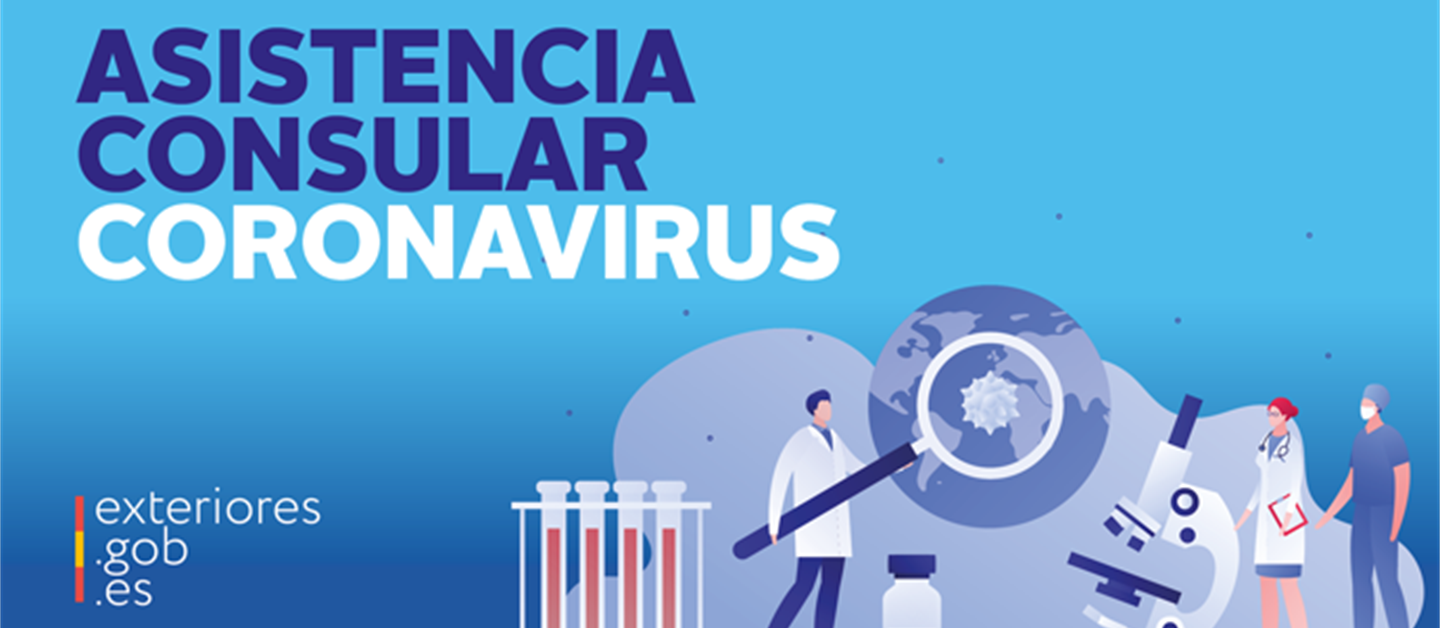
Covid19 - Entry requirements in Spain
Beginning on October 21, 2022, the following travelers can enter Spain without showing any sort of covid-19 document/certificate:
- Spaniards and EU citizens.
- Duly registered family members of Spanish and EU citizens.
- Foreigners residing in the European Union or associated Schengen countries (it is necessary to have a valid residence card).
- Foreigners who have a valid long-term visa (no type C visas).
- Foreign students who have the required visa and insurance.
- Foreigners who are highly qualified workers, business people, elite sportspeople, health professionals and health researchers, transport personnel, seafarers and aeronautical personnel and diplomatic, consular representatives, personnel of international organization, military personnel and members of civil protection organizations traveling to Spain for professional matters.
- Foreigners traveling for urgent humanitarian or family reasons, to be justified case by case.
These travelers can enter Spain normally, as it was before the pandemic started.
The rest of the travelers to Spain, even if the covid-19 border checkpoints have been dismantled, they must have one of the three following certificates:
- Proof of vaccination: Documentation from the issuing countries' relevant authorities will be accepted starting 14 days after the final dose is administered, as long as more than 270 days have not passed since the administration of the final dose of the vaccine. For those under 18 years of age, proof of vaccination has no expiration date.
- Negative COVID test: A negative Nucleic Acid Amplification test (PCR, TMA, LAMP, NEAR, etc.) taken within 72 hours of departure for Spain, or a negative rapid antigen test (RAT) taken within 24 of departure for Spain, will be accepted.
- Proof of recovery from COVID: Documentation issued by relevant government authorities or by a physician a minimum of 11 days after the initial positive result via NAAT or rapid antigen test. This documentation will remain valid for 180 days following the date of the initial positive test result.
Those under the age of 12 do not need to present any COVID-related documentation to enter Spain.
Spain Travel Health –SpTH– and the associated form are no longer needed.

Search Smartraveller

Latest update
Exercise normal safety precautions in Spain.
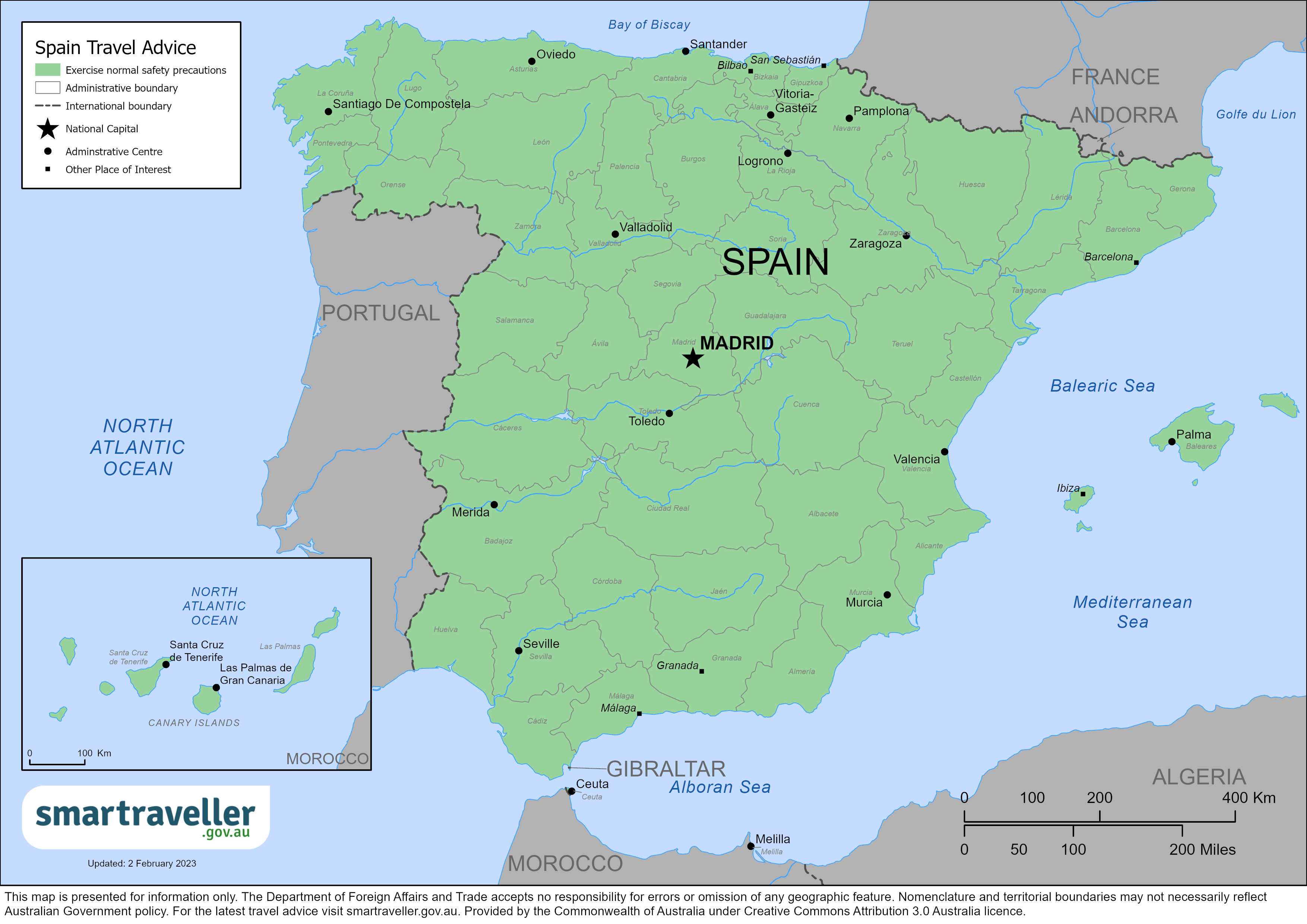
Spain (PDF 351.93 KB)
Europe (PDF 2.62 MB)
Local emergency contacts
Fire and rescue services, medical emergencies, advice levels.
Exercise normal safety precautions in Spain.
- Terror attacks have occurred. Authorities have stopped some attacks. The national terrorism alert for Spain is 'high'. Always be aware of possible threats. Take official warnings seriously.
- Demonstrations and strikes can occur and disrupt transport. Sometimes, protesters clash with police. Avoid unrest.
- Watch out for bag snatching, pickpocketing and theft from cars in large cities. Petty crime is a serious problem in Barcelona. Take care at tourist spots, beaches and on transport.
- Taking part in the Running of the Bulls in Pamplona is dangerous. Check your travel insurance covers you.
- Spain experiences earthquakes, volcanic eruptions, severe storms and forest fires. Monitor local media for updates.
Full travel advice: Safety
Health risks are similar to those in Australia.
- The standard of medical facilities is high.
Full travel advice: Health
- Always carry personal ID. You should carry a copy of your Australian Passport for ID, either as a hardcopy or as a photo on your phone. Police can detain you until they can confirm your identity.
- Don't photograph military sites.
- Spain doesn't recognise dual nationality. Always travel on your Australian passport.
Full travel advice: Local laws
- Spain is a part of the Schengen area , along with many other European countries. This allows you to enter without a visa in some cases.
- You'll need a visa if you're travelling for a purpose other than tourism. If you plan to stay longer than 90 days, please contact the Spanish Embassy or Consulates in Australia before travelling to Spain.
Full travel advice: Travel
Local contacts
- The Consular Services Charter details what we can and can't do to help you overseas.
- For consular help, contact the Australian Embassy in Madrid or the consulate in Barcelona .
- Stay up to date with local information and follow the Embassy's social media accounts.
Full travel advice: Local contacts
Full advice
Terrorist attacks in Spain are likely, and attacks can occur at any time
The national terrorism alert level for Spain is 'high'.
In recent years, terrorists have staged attacks in Spain and other European cities. Targets have included:
- public transport
- transport hubs
- places of worship
- sporting venues
- public places popular with tourists
Spain has increased security in public places, such as:
- shopping areas
- tourist sites
- major events that attract large crowds
Security services have stopped some planned attacks.
To reduce your risk, you should:
- be aware of possible threats when planning activities
- be alert in public places known to be possible terrorist targets
- monitor the media for updates
- report anything suspicious to the police
- follow official warnings
- follow the advice of local authorities
If there's an attack, leave the area as soon as it's safe. Avoid the affected area in case of secondary attacks.
Terrorism is a threat worldwide.
More information:
Civil unrest and political tension
Demonstrations occur regularly throughout Spain.
Demonstrations and strikes can disrupt traffic and transport, including air, rail and other public services.
Some demonstrations held close to tourist areas in large cities have ended in clashes with police and resulted in injuries.
Public protests and events that draw large groups of people can turn violent.
To reduce risks:
- avoid protests and demonstrations, and exercise caution if you're caught up in large gatherings/protests
- monitor local media for possible strikes and unrest
- avoid affected areas
In the event of a protest or demonstration, contact your travel agent or tour operator for information on your transport bookings. Be ready to change your plans.
- Demonstrations and civil unrest
Petty crime
Petty crime is common in large cities. It's a serious problem in Barcelona, especially on public transport and tourist areas.
Petty crime includes:
- bag snatching
- pickpocketing
- theft from cars
Thieves are very active during the peak summer tourist season. They target:
- tourist attractions
- public transport, railway stations and cruise terminals
- airports, including airside, after passing through airport security
- restaurants and cafes
- hotel foyers
- car parking areas or car hire companies
Take care when placing bags on chairs or the ground in restaurants and outdoor cafes.
Thieves often work in gangs. While you're distracted, another thief steals your belongings. Thieves try to distract you by:
- asking for help or directions
- deliberately spilling something on you
Violent theft is less common but may also occur.
To protect yourself from petty crime:
- take care of your personal belongings, especially in crowds
- leave your passport and other valuables in a safe location
- avoid walking in quiet, poorly lit streets
- monitor local sources for information about possible safety or security risks
Keep your passport and other ID separate. We recommend you carry a copy of your passport for ID, either as a hard copy or as a photo on your phone.
Road crime occurs throughout Spain.
Take care driving from Marseille in France to Valencia in Spain along the Mediterranean coast. Cars with foreign number plates are often targets.
Thieves working in pairs may convince you to stop because of a 'problem' with your vehicle, then offer to help with a flat or slashed tyre. While one helps, the other steals your belongings.
Never leave your luggage unattended, even inside your vehicle. Keep luggage and personal belongings out of sight.
To stay safe when on the road:
- never leave valuables in your vehicle
- be wary of offers of help
- always keep car doors locked, even when driving
- use secure parking facilities when you can, especially overnight
- don't leave your vehicle unattended for long periods
Thieves also break into caravans and motor homes, particularly in public parking areas.
Credit card fraud
Credit card and ATM fraud can occur.
Avoid using ATMs that open onto the street, especially at night. Use ATMs in banks, shops, and shopping centres.
Drink spiking
Cases of drink spiking, followed by theft and sexual assault , are reported.
To protect yourself from crime:
- stick with people you trust in bars and nightclubs
- never accept food or drinks from strangers
- don't leave your food or drink unattended
- Partying safely
Gender violence
Spanish authorities have various emergency numbers for victims of gender violence.
- Call 112 for 24-hour assistance from any of the emergency services in Spain. English-speaking staff are available.
- Call 016 (Whatsapp 600 000 016 or email [email protected] ). This is a 24 hours a day, 365 days a year helpline for victims of gender violence. It is accessible for people with hearing difficulties and is available in 53 languages.
More Information:
- Sexual assault
Scams are common.
Be aware of the latest scams. Don't become a victim.
Some complex scam operations are based in Spain. Inheritance scams are the most common.
Inheritance scams involve receiving an email from someone claiming to be a lawyer. They tell you an unknown Spanish relative has died and left you money.
If you've been a victim of a scam, don't travel to Spain. Seek legal advice.
Cyber security
You may be at risk of cyber-based threats during overseas travel to any country. Digital identity theft is a growing concern. Your devices and personal data can be compromised, especially if you're connecting to Wi-Fi, using or connecting to shared or public computers, or to Bluetooth.
Social media can also be risky in destinations where there are social or political tensions or laws that may seem unreasonable by Australian standards. Travellers have been arrested for things they have said on social media. Don't comment on local or political events on your social media.
More information:
- Cyber security when travelling overseas
Climate and natural disasters
Spain experiences natural disasters and severe weather .
If there's a natural disaster, follow the advice of local authorities.
Earthquakes
Spain experiences earthquakes , but major quakes are rare.
Volcanic eruptions occurred in 2021 on La Palma in the Canary Islands. There's seismic activity on the Canary Island of El Hierro. The risk level set by local authorities is Green, which is level 1 of 3.
- Canary Islands Government
Severe weather
Sometimes, Spain experiences extreme storms, especially along the northern coast and islands.
Heavy snow in winter (December to February) can affect northern areas.
Forest fires
Forest fires can occur from May to September. The risk is higher in rural areas.
Strict fines apply for any actions that could start a fire. If camping, ask local authorities for advice on fire danger and fire restrictions.
If there's a forest fire:
- follow the advice of local authorities, including evacuation orders
- keep in contact with family and friends
Adventure travel
Running of the bulls.
Taking part in the Running of the Bulls is dangerous. Every year, people are badly injured and sometimes killed.
People are also killed or badly injured jumping from fountains during the festivities in Pamplona.
Ensure you have travel insurance and that your policy covers you for planned activities. Don't take unnecessary risks.
Your travel insurance may not cover you if:
- you take part in the Running of the Bulls
- jump from fountains
- take other risks
Medicare doesn't cover you if you're in Spain.
Swimming safety
Every year, several people drown in the sea and in swimming pools in Spain.
Some beaches, especially around Spanish islands, may have strong undercurrents.
Swim at supervised beaches and follow the flag system that warns against dangerous swimming conditions.
If you plan to spend time in or on the water:
- regularly check weather reports
- take warnings seriously
- check media and local sources for information about potential dangers
- speak to your travel provider about safety equipment and weather conditions before continuing with planned activities
- if possible, take a friend or family member with you when you undertake swimming or water activities
- ensure you have travel insurance and that your policy covers you for planned activities
Travel insurance
Get comprehensive travel insurance before you leave.
Your policy needs to cover all overseas medical costs, including medical evacuation. The Australian Government won't pay for these costs.
If you can't afford travel insurance, you can't afford to travel. This applies to everyone, no matter how healthy and fit you are.
If you're not insured, you may have to pay thousands of dollars up-front for medical care.
- what activities and care your policy covers
- that your insurance covers you for the whole time you'll be away
Physical and mental health
Consider your physical and mental health before you travel, especially if you have an existing medical condition.
See your doctor or travel clinic to:
- have a basic health check-up
- ask if your travel plans may affect your health
- plan any vaccinations you need.
Do this at least 8 weeks before you leave.
If you have immediate concerns for your welfare or the welfare of another Australian, call the 24-hour Consular Emergency Centre on +61 2 6261 3305 or contact your nearest Australian Embassy, High Commission or Consulate to discuss counselling hotlines and services available in your location
- General health advice
- Healthy holiday tips (Healthdirect Australia)
Not all medications available over the counter or by prescription in Australia are available in other countries. Some may even be considered illegal or a controlled substance, even if prescribed by an Australian doctor.
If you plan to bring medication, check if it's legal in Spain. Contact the Spanish Embassy or Consulate in Australia before travelling to Spain. Take enough legal medicine for your trip.
You can't mail or courier medication from Australia to Spain.
Carry a copy of your prescription or a letter from your doctor stating:
- what the medication is
- your required dosage
- that it's for personal use
Contact DFAT if you need medical documents authenticated .
Health risks
Monitor the media and other sources for new health risks.
Follow the advice of Spain's Ministry of Health
Medical care
The standard of medical facilities in Spain is similar to those in Australia.
Most doctors don't speak English. A list of English-speaking doctors and medical facilities can be found on the Australian Embassy website.
There's no shared healthcare agreement between Australia and Spain.
Medical evacuation can be very expensive.
You're subject to all local laws and penalties, including those that may appear harsh by Australian standards. Research local laws before travelling.
If you're arrested or jailed, the Australian Government will do what it can to help you under our Consular Services Charter . But we can't get you out of trouble or out of jail.
- Arrested or jailed
Penalties for drug offences include heavy fines and prison time.
- Carrying or using drugs
Always carry personal ID. This may include:
- your original driver's licence
- a copy of your passport, either in hardcopy or as a photo on your phone
Police may ask to see ID. They can detain you until they can confirm your identity. Carry a copy of your Australian passport as a hard copy or a photo on your phone.
Don't photograph military installations.
Australian laws
Some Australian criminal laws still apply when you're overseas. If you break these laws, you may face prosecution in Australia.
- Staying within the law and respecting customs
Dual citizenship
Spain doesn't recognise dual nationality.
If you're a dual citizen, this limits the consular services we can give if you're arrested or detained.
Always travel on your Australian passport .
- Dual nationals
Visas and border measures
Every country or territory decides who can enter or leave through its borders. For specific information about the evidence you'll need to enter a foreign destination, check with the nearest embassy, consulate or immigration department of the destination you're entering.
Entry and exit conditions can change at short notice. Contact your airline or your nearest Embassy or Consulate of Spain for details about the latest visa and entry requirements.
Spain is a part of the Schengen Area , along with many other European countries. This allows you to enter without a visa in some cases.
You'll need a visa if:
- you're travelling for a purpose other than tourism
- you plan to stay longer than 90 days
Ensure you get a legible entry stamp in your passport when you first enter the Schengen Area.
Some airlines may want to see proof of entry in the Schengen Area or to check you haven't overstayed the 90-day period.
Carry copies of your passport in hard copy or as a photo on your phone in case authorities stop you. See Local laws
Some countries won't let you enter unless your passport is valid for 6 months after you plan to leave that country. This can apply even if you're just transiting or stopping over.
Some foreign governments and airlines apply the rule inconsistently. Travellers can receive conflicting advice from different sources.
You can end up stranded if your passport is not valid for more than 6 months.
The Australian Government does not set these rules. Check your passport's expiry date before you travel. If you're not sure it'll be valid for long enough, consider getting a new passport .
Lost or stolen passport
Your passport is a valuable document. It's attractive to people who may try to use your identity to commit crimes.
Some people may try to trick you into giving them your passport. Always keep it in a safe place.
If your passport is lost or stolen, tell the Australian Government as soon as possible:
- In Australia, contact the Australian Passport Information Service .
- If you're overseas, contact the nearest Australian Embassy or Consulate .
Passport with 'X' gender identifier
Although Australian passports comply with international standards for sex and gender, we can't guarantee that a passport showing an 'X' in the sex field will be accepted for entry or transit by another country. Contact the nearest embassy, high commission or consulate of your destination before you arrive at the border to confirm if authorities will accept passports with 'X' gender markers.
- LGBTI travellers
The currency of Spain is the Euro (€).
If you're travelling to or from any non-European Union (EU) country, declare funds of 10,000 Euro or more, including the equivalent in another currency. This covers all forms of currency, not only cash.
If you fail to declare currency or give wrong information, you'll be fined. You don't need to declare funds if you're travelling to or from another EU country.
Local travel
C arry your passport when crossing borders, even within the Schengen Area.
To avoid delays:
- monitor the local media for border conditions
- ask your transport provider for updates
Tourist information
Some areas of Spain are popular party destinations. See Safety
If you're travelling to Morocco, read our travel advice for Morocco .
Driving permit
To drive a vehicle, you'll need both:
- a current Australian driver's licence
- a valid international driving permit (IDP). Contact the Australia Automobile Association on www.aaa.asn.au for further information.
If you drive without an IDP, you may be fined and your car impounded.
Road travel
Be cautious when you drive or travel as a passenger. Keep your doors locked, even when moving. Lock your vehicle when you leave it.
Driving in urban areas can be dangerous due to:
- traffic congestion
- aggressive driving
- excessive speeding
Check your vehicle has 2 red warning triangles and a reflective jacket. You must use these in an accident or breakdown.
You can be fined if your vehicle doesn't have these items.
If you hire a vehicle, get safety equipment. Ask the rental company about local traffic rules.
When pollution levels are high in Madrid, temporary car-use restrictions may apply.
To contact the English-speaking 'Línea Madrid' citizen information and support line:
- call 010 from Madrid
- call (+34) 915 298 210 from outside Madrid
In addition to the general traffic regulations, there are specific regulations regarding the use of electric scooters.
- Driving or riding
DFAT doesn't provide information on the safety of individual commercial airlines or flight paths.
Check Spain's air safety profile with the Aviation Safety Network.
- Air travel
Emergencies
Depending on what you need, contact your:
- family and friends
- travel agent
- insurance provider
Emergency phone numbers
For non-emergency criminal issues, contact the local police.
Always get a police report when you report a crime.
Your insurer should have a 24-hour emergency number.
Consular contacts
Read the Consular Services Charter for what the Australian Government can and can't do to help you overseas.
The Australian Government has two offices in Spain:
- an Embassy in Madrid
- a Consulate in Barcelona
The Embassy provides the full consular services as described in the Consular Services Charter .
The Consulate provides limited consular assistance to Australians in Barcelona.
Australian Embassy, Madrid
Level 24, Torre Emperador Castellana Building Paseo de la Castellana, 259D 28046 Madrid, Spain Phone: (+34) 91 353 6600 Email: [email protected] Website: spain.embassy.gov.au Facebook: Embajada de Australia en España, Andorra y Guinea Ecuatorial X: @AusEmbEsp
Australian Consulate, Barcelona
Avenida Diagonal, 482, Fifth Floor 08006 Barcelona, Spain Phone/Fax: (+34) 93 715 5866 Email: [email protected]
Check the Embassy website for details about opening hours and any temporary changes.
24-hour Consular Emergency Centre
In a consular emergency, if you can't contact an embassy, call the 24-hour Consular Emergency Centre on:
- +61 2 6261 3305 from overseas
- 1300 555 135 in Australia

Travelling to Spain?
Sign up to get the latest travel advice updates..
Be the first to know official government advice when travelling.
Travel Safe

Spring time is here! Spain is filled with plans for you
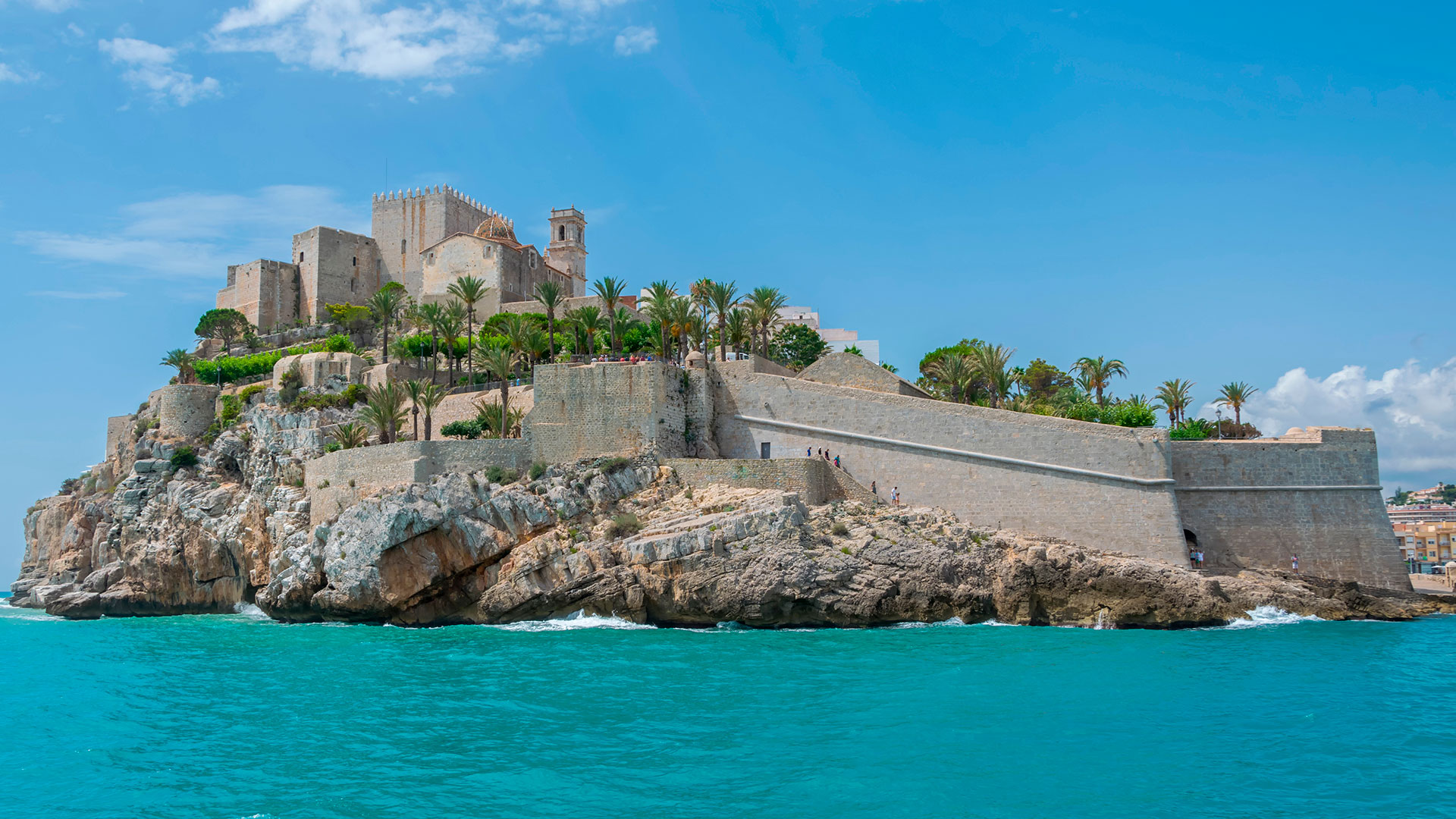
Visit fairytale castles in Spain's most beautiful towns

15 spectacular blossoms to experience up close

Route of the Monasteries in the Ribeira Sacra

Chillida, 100 years of the universal Basque artist

Start the route with the best music festivals
Discover our destinations

The capital city with a thousand options

One of Spain’s most avant-garde cities

A great city with lots to discover

A cosmopolitan vibe

The essence of the Mediterranean
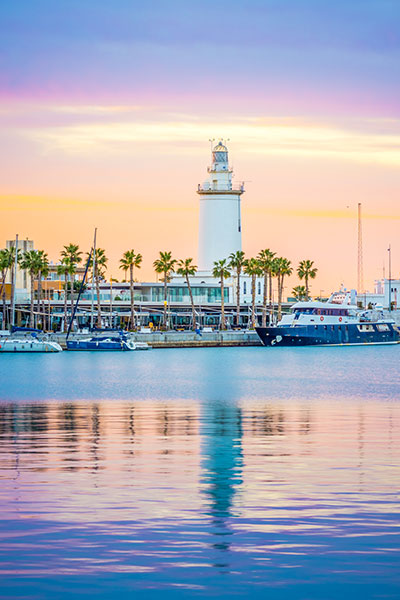
The capital of the Costa del Sol is reinventing itself

An inspiring destination

The final destination of St. James’ Way

The Golden city of a thousand legends

Ideal for a getaway

A picturesque medieval setting

European sunshine capital
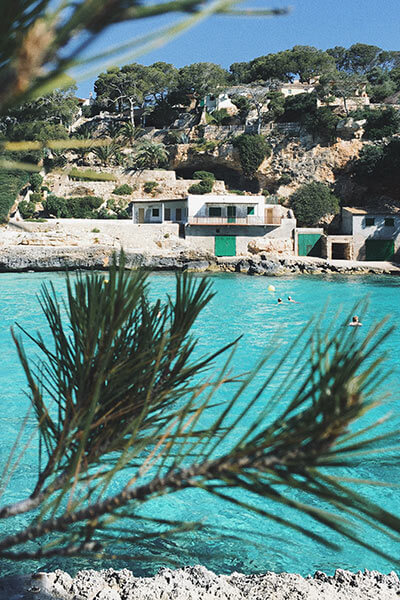
Idyllic coves, beautiful sunsets...

Santiago de Compostela
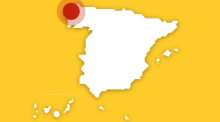
Canary Islands
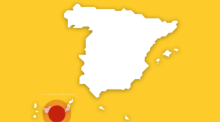
Balearic Islands
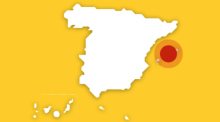
Not to be missed
Choose the travel plan you like the most to make your stay in Spain unforgettable

Holiday ideas in Spain, depending on how and with whom you travel

Museum Day is coming! Here are some ideas to make the most of it
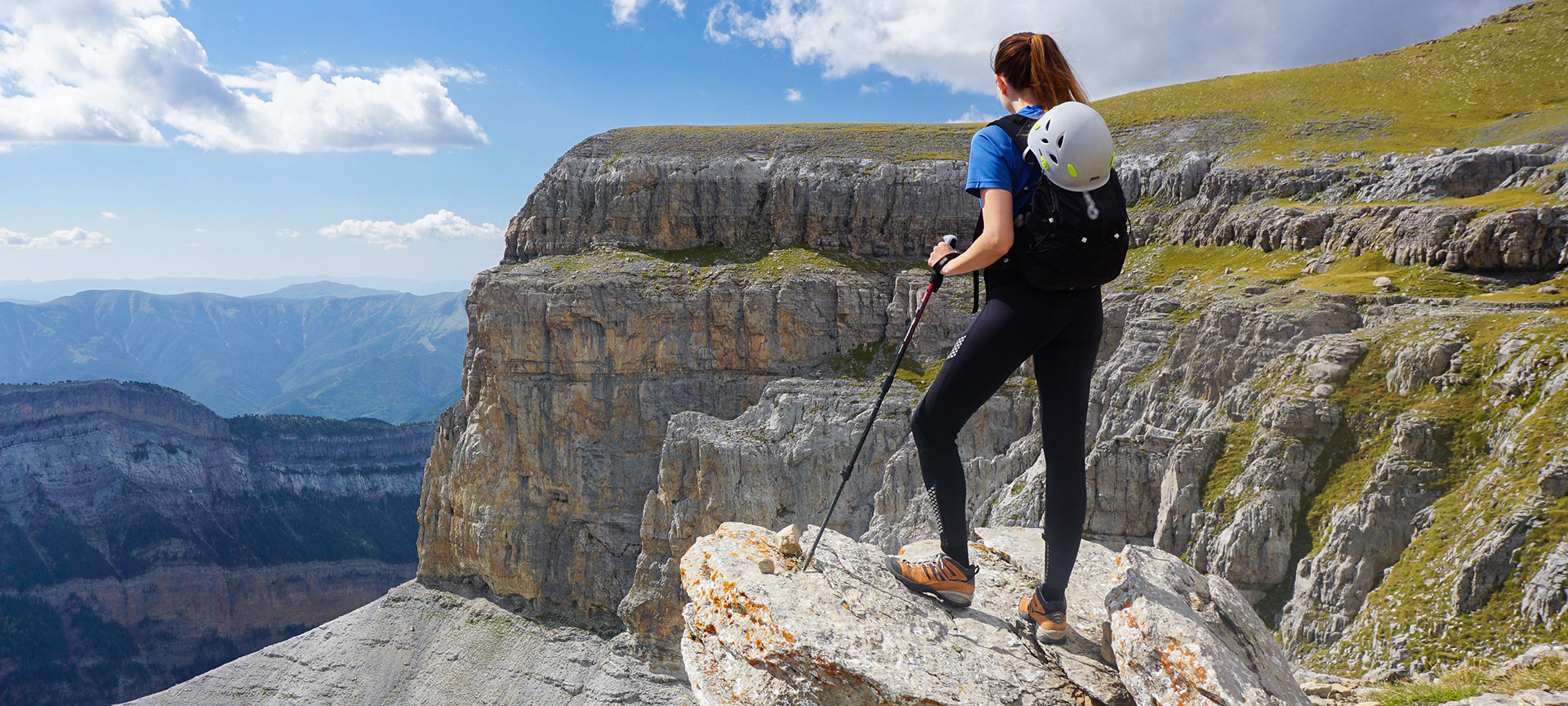
Sport and adventure
Come for a multi-adventure outing! Do you dare?

Urban tourism
Cordoba: the city with four visits to places considered as World Heritage sites, packed with festivals in May
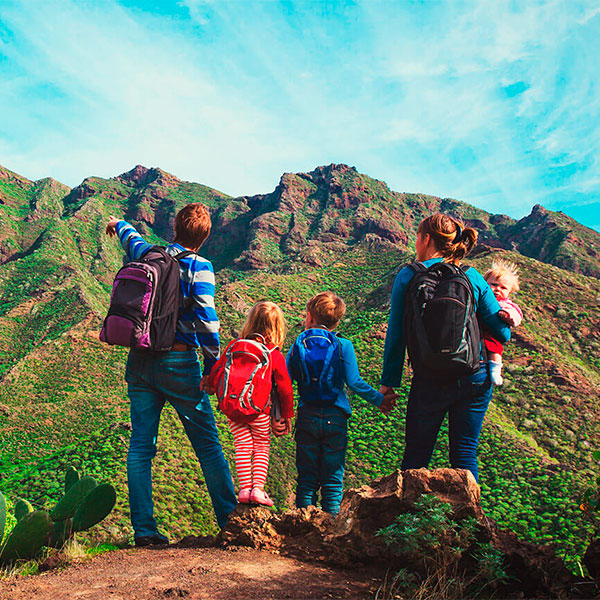
Prepare a family getaway to the countryside

Other ideas for your trip
Do you want some more suggestions for your holidays?

Most popular spain.info TikTok videos

Our 10 most-liked photos on Instagram

Rediscovering Madrid and Barcelona

Magical natural places in Spain
Are you sure you want to delete this route?

Route planner
Create your own plan for your trip to Spain with a route to suit your requirements
Enjoy the best events
Exhibitions, festivals, festivities... Don't miss a thing!

16 March 2024 - 03 May 2024
Cherry Blossom Festival

22 April 2024 - 05 May 2024
Tennis: Madrid Open

03 May 2024 - 05 May 2024
International Comic Fair

02 May 2024 - 12 May 2024
Festival of the Courtyards in Cordoba

17 May 2024 - 20 May 2024
Pilgrimage of El Rocío

30 May 2024
Corpus Christi in Toledo
All the useful information you need.
Trip advice to get the most out of your holidays
The weather in Spain
Today in: Bilbao
How to get there
How to get around, practical information.

Book your experience
Thousands of activities thought out for you
#visitSpain
Share the best of Spain on our networks
The best ideas for travelling around Spain
Subscribe to receive monthly information with unique travel plans


IMAGES
COMMENTS
Spain has suffered greatly from Covid-19, with a high number of cases and deaths. The Omicron coronavirus variant caused a peak in Spain earlier in 2022, but cases have since dropped. Spain is ...
Spain added the United States to the list of countries whose residents no longer require a proof of vaccination or a negative COVID-19 test for travel to Spain, including if they transit through a third country. If transiting a third country, please check that country's requirements as well, since they may be different.
Spain entry details and exceptions. Travelers from Russia cannot fly directly to Spain. This page covers COVID-19 related travel restrictions only. For other travel restrictions, please check the guidance from your local authorities.
FCDO travel advice for Spain. Includes safety and security, insurance, entry requirements and legal differences. ... COVID-19 rules. There are no COVID-19 testing or vaccination requirements for ...
Travelers in Palma de Mallorca on June 13. CATI CLADERA (EFE) The summer season has arrived and Spain is hoping for an influx of foreign visitors to revitalize its struggling tourism and hospitality sectors. While an uptick in domestic travel is helping, businesses know that the numbers will only add up when the international visitors show up.
The Spanish government has tightened entry requirements to the country due to concerns over the new variant of the coronavirus, named omicron by the World Health Organization (WHO).. Under the new rules, published Saturday in the Official State Gazette (BOE), travelers from "high-risk" countries will need to present proof of being fully vaccinated, or of having recovered from Covid-19, as ...
passengers in international transit), must have a COVID-19 vaccination, negative certificate of an active infection diagnostic test or a recovery certificate after having this disease. 2. Those ... //spth.gob.es or the Spain Travel Health application -SpTH- (Android, iOS, Huawei) manually entering the details of their ...
Reissued with obsolete COVID-19 page links removed. Exercise increased caution in Spain due to terrorism and civil unrest.. Country Summary: Terrorist groups continue plotting possible attacks in Spain.Terrorists may attack with little or no warning, targeting tourist locations, transportation hubs, markets/shopping malls, local government facilities, hotels, clubs, restaurants, places of ...
It should be noted that in the case of the United Kingdom, Spain remains on the government's "amber list." This means travelers returning to the UK from Spain must take a coronavirus test before travel, quarantine for at least 10 days on return, and take two home PCR tests that must come back negative before quarantine can end.
Living in Spain. Travelling to Spain. FCDO travel advice for Spain. Includes safety and security, insurance, entry requirements and legal differences.
Travelers can still enter Spain with proof of vaccination or proof they contracted COVID-19 and recovered within 6 months. Children under 12 are exempt from showing any vaccination or test ...
Ministerio de Sanidad
After peaking in late January at nearly 900 new cases per 100,000 residents in 14-days, the coronavirus contagion indicator in Spain has dropped to 117 per 100,000.
Travel during daylight hours only, especially in rural areas. If you choose to drive a vehicle in Spain, learn the local traffic laws and have the proper paperwork. Get any driving permits and insurance you may need. Get an International Driving Permit (IDP). Carry the IDP and a US-issued driver's license at all times.
COVID-19. Coronavirus disease (COVID-19) is an infectious viral disease. It can spread from person to person by direct contact and through droplets in the air. It is recommended that all eligible travellers complete a COVID-19 vaccine series along with any additional recommended doses in Canada before travelling.
An average of 1,013 cases per day were reported in Spain in the last week. Cases have increased by 1 percent from the average two weeks ago. Deaths have decreased by 53 percent. Since the ...
Call us in Washington, D.C. at 1-888-407-4747 (toll-free in the United States and Canada) or 1-202-501-4444 (from all other countries) from 8:00 a.m. to 8:00 p.m., Eastern Standard Time, Monday through Friday (except U.S. federal holidays). See the State Department's travel website for the Worldwide Caution and Travel Advisories.
Spain has introduced restrictions for travelers who are not Spanish nationals, and has introduced a series of measures including significant restrictions on movement throughout the country in response to the coronavirus outbreak.. Temporary border controls have been introduced between Spain and its neighboring countries.
Covid19 - Entry requirements in Spain. Beginning on October 21, 2022, the following travelers can enter Spain without showing any sort of covid-19 document/certificate: Spaniards and EU citizens. Duly registered family members of Spanish and EU citizens. Foreigners residing in the European Union or associated Schengen countries (it is necessary ...
Travel agents said a "final hurdle" for holidays had been removed. Other European destinations such as France, Italy and Greece lifted their rules prior to Spain, which is the most popular ...
Authorities have stopped some attacks. The national terrorism alert for Spain is 'high'. Always be aware of possible threats. Take official warnings seriously. Demonstrations and strikes can occur and disrupt transport. Sometimes, protesters clash with police. Avoid unrest. Watch out for bag snatching, pickpocketing and theft from cars in large ...
07/05/2022 July 5, 2022. Travel in Europe is subject to restrictions due to the COVID pandemic. The omicron variant has led to higher numbers of infections, but which are often less severe.
Tourist information about Spain: art, culture, museums, monuments, beaches, cities, fiestas, routes, cuisine, natural spaces in Spain | spain.info. Spain's official tourism website. Search. ... Choose the travel plan you like the most to make your stay in Spain unforgettable. Routes. Holiday ideas in Spain, depending on how and with whom you ...
Under the new rules, travellers coming from countries identified as "risk" zones will be able to enter Spain so long as they have a "certificate of vaccination" or "recovery" from coronavirus, as ...
WHO welcomed Mr Javier Padilla Bernáldez, Spain's Secretary of State for Health and his delegation on 23 and 24 April 2024 to discuss joint global health priorities. Amongst others, Spain focus is on universal health coverage and health systems strengthening; pandemic response and emergency medical teams; organ and tissue transplantation; malaria and other tropical diseases; and polio.
International flights in China experienced a sluggish recovery last year following the lifting of coronavirus-related restrictions, while a recent uptick in travel ahead of the May Day holiday ...